Joint statement welcoming EU’s top court judgment to correct a trans man’s gender identity data in national registry
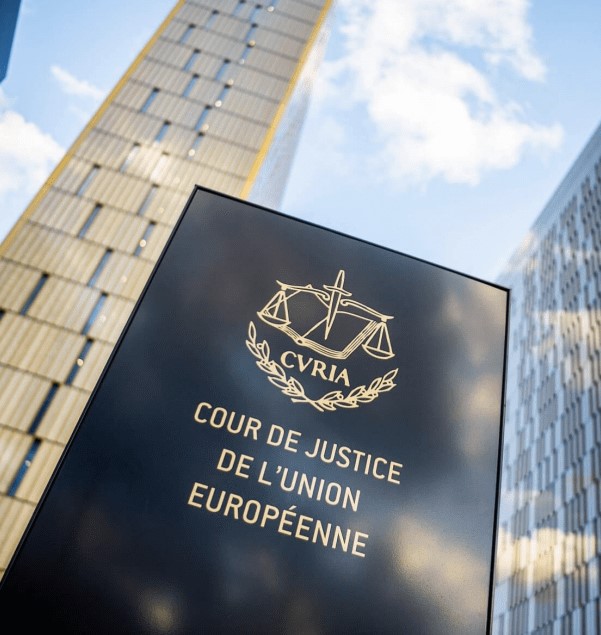
Today, the European Court of Justice (CJEU) issued a judgment in the case of Deldits (C-247/23), stating that national authorities responsible for keeping public registers (such as asylum registers) should correct data on gender identity when it is inaccurately recorded. This decision carries significant implications for advancing human rights protections in the EU, at a time when trans people and human rights in general are under massive attack.
Background
A trans refugee in Hungary seeks legal gender recognition
This case concerns an applicant who was granted refugee status in Hungary based on a well-founded fear of persecution in his country of origin because of his gender identity. The applicant requested the correction of his gender marker and name on the national asylum registry (as it reflected his name and sex at birth) under Article 16 of the EU’s General Data Protection Regulation (GDPR) on the basis that the data was inaccurate.
A legal paradox: Granted asylum but denied recognition
Despite the Hungarian authorities granting the applicant refugee status on this ground, he found himself in a paradox: his gender marker was registered incorrectly, and he could not correct it as there is no legal framework regulating the conditions for legal gender recognition (LGR) in the country.
Hungary’s ban on legal gender recognition
This case is a pivotal moment in the ongoing battle for the rights of trans people in Hungary, which has banned LGR for citizens in 2020, whilst refugees never had access to LGR. Moreover, Hungarian authorities requested proof of surgery as a precondition to change the applicant’s gender marker – a practice that the European Court of Human Rights has declared to be in violation of the right to respect for private and family life as protected by Article 8 of the Convention since 2017.
GDPR and human rights
The case raised several important questions for the CJEU: whether the GDPR mandates the correction of gender markers in national registries upon request. If so, does this request require evidence? If so, does it need to include proof of surgical intervention?
CJEU ruling strengthens trans rights and data accuracy rules
Today’s CJEU ruling addresses these questions, and is very favourable. It confirms that the right to rectification under Article 16 GDPR, taken in conjunction with the principle of data accuracy under Article 5(1)(d) GDPR, require authorities, without undue delay, to correct personal data concerning gender identity which is held in public registers when such data is inaccurate.
Importantly, the Court stated that if the purpose of collecting personal data is to identify the individual, the data should refer to the person’s lived gender identity, and not the identity assigned to them at birth. In that respect, the Court underlined that a Member State cannot invoke the absence of a domestic procedure for LGR to limit the exercise of the right to rectification under GDPR.
Secondly, the Court clarified that a person may need to provide reasonable proof to correct inaccurate data, but Member States cannot require proof of ‘gender reassignment surgery’ “under any circumstances”. The Court stated that such a requirement goes against the right to personal integrity (Article 3) and the right to privacy (Article 7) of the Charter of Fundamental Rights.
The Hungarian authorities must now allow for a change of gender marker in the Asylum Registry and all other national registries. However, instead of patchwork procedures by each data controlling entity in the country, the Hungarian government needs to urgently create legal certainty and set up a legal framework for quick, transparent and accessible procedure for LGR, where individuals can adapt their documents to match with their gender identity. The European Court of Human Rights already found that Hungary violates the European Convention on Human Rights for failing to allow such procedure (R.K. v. Hungary, 2023) including for trans refugees (Rana v Hungary, 2020).
The CJEU ruling is also binding upon national authorities keeping a public register across all EU Member States.
Reactions
TGEU Expert Advisor, Richard Köhler, comments: “Trans people deserve accurate personal data—full stop. Today’s Court ruling sends a clear message: while Member States control legal gender recognition processes, they must respect EU law. Evidence can be requested, but surgical proof? Absolutely forbidden.
This isn’t just about refugees—it’s also about asylum seekers and citizens. Where public records are kept to identify people, Member States need to recognise that a person’s real identity is what matters, not labels given at birth. The Court couldn’t be clearer: surgery requirements and forced sterilisation violate EU data protection law. Now, Member States must take action. No more delays. No more excuses. The message is simple: recognise people’s identities without invasive demands. The EU Commission must support Member States with implementation and take decisive action against those who continue to deny trans people their fundamental rights.“
ILGA-Europe Advocacy Director, Katrin Hugendubel, said: “This judgment is a significant step forward for the rights of trans people, including refugees, in the EU – especially in Member States without any legal framework for LGR. At a time when the rights of trans and LGBTI people in general are under constant threat, we call on Member States to implement this ruling by ensuring that their frameworks for collecting and storing personal data are GDPR and fundamental rights compliant. We also call on the EU Commission to actively monitor the implementation of this judgment and to encourage Member States to bring their frameworks for LGR in line with international human rights and EU law standards.”
According to Gábor Győző, the attorney representing the applicant in the proceedings on behalf of Háttér Society and the Hungarian Helsinki Committee, “it is very important and welcomed that the Court not only addressed the specifics of the case, but also assessed the Hungarian legal framework and the protection of the rights of trans people in a broader context. Moreover, this decision also serves as a guideline for all other Member States on this issue.”
“Trans people have been subject to constant governmental harassment in recent years. The judgment is a ray of hope that they cannot be deprived of their rights and denied their existence,” added Eszter Polgári, Director of the Legal Program of Háttér Society.
Joint calls to action
We call on EU governments to adhere to this CJEU ruling and proactively check their national procedures for a GDPR and European human rights compliant framework that allows individuals to quickly, transparently and in an accessible way update gendered data that is held on them. As EU data protection rules apply to anyone in the EU, they also need to ensure data of asylum seekers alongside refugees can be easily updated to reflect a person’s gender identity.
We call on the EU Commission to monitor the implementation of the Deldits case into national case law and adherence of the national authorities to the final decision. Failure in compliance needs to lead to infringement procedures. National Data Protection Authorities (DPAs) should equally monitor implementation and issue fines for non-compliant data controllers.
For a uniform understanding and application across the EU on both the Deldits and Mousse CJEU case law, we call on the Commission to provide practical guidance and the possibility to exchange for Member States and data controllers on implementation.
As EU data protection rules also apply to private actors, any organisation collecting, storing, or processing personal data on names and gender markers needs to check their processes for allowing correction of the data that they hold.
We urge EU institutions and Member States to ensure trans people have access to quick, transparent and accessible paths to LGR.
Congratulations to everyone involved for this incredible victory. Your efforts and dedication will make a huge impact on trans lives across the EU.
ILGA-Europe and TGEU provided support in the CJEU procedure to Háttér Society, which represented the applicant together with the Hungarian Helsinki Committee in this case.
Context
Today’s judgement comes on the heels of a groundbreaking data protection case strengthening the rights of non-binary people, Mousse (C-394/23). In this judgment, the CJEU found that the collection of gendered civil tiles (Mr/Mrs) when purchasing train tickets by a railway company is not necessary for providing transportation services and hence not compliant with the GDPR principle of data minimisation.
EU data privacy rules
The GDPR is Europe’s powerful privacy law that protects people’s personal data by giving them control over how private and public organisations collect, use and store their information. It applies to all organisations handling EU residents’ data anywhere in the world, and goes far beyond cookie settings—it ensures organisations get proper consent, minimise data collection, secure information properly, and allow people to access, correct, or delete their own data.
Today’s judgment particularly addresses national authorities and public registers. Therefore, it goes beyond asylum registers and may well have implications for national civil registries and how such personal data can be corrected.
The Court reaffirmed that regulation of legal gender recognition continues to be within the remit of Member States, but that they must respect EU data protection and fundamental rights when doing so.
Read Háttér Society’s press release here.
ILGA-Europe Statement: Turkey is detaining LGBTI+ activists and journalists, and targeting basic rights

The Turkish government has intensified its repression of LGBTI+ human rights defenders, detaining activists and introducing draconian laws that further restrict legal gender recognition, trans healthcare, and free expression. The proposed measures mirror anti-LGBTI+ laws in Russia and Hungary, prompting urgent calls for action.
The last two weeks have seen an increasingly severe crackdown on LGBTI+ human rights defenders and activists in Turkey. This comes during a time when the Turkish government is eroding civic rights and freedoms, including detaining journalists, opposition politicians, and targeting civil society organisations (CSOs) through smear campaigns and further restrictive legislation.
On 18 February, journalist and Editor-in-Chief of KaosGL.org, a news portal dedicated to LGBTI+ issues, Yıldız Tar, was arrested and accused of “membership in a terrorist organisation”. They were arrested alongside a number of journalists, activists (including Erkin – a trans activist), artists and opposition MPs, amounting to 52 arrests that day.
The following week, on 27 February, draft amendments of the Turkish government were leaked to the press which aim to amend the Criminal and Civil Codes to further restrict access to legal gender recognition and trans-specific healthcare, ad criminal sanctions to these as well as criminal sanctions for “any person who publicly encourages, praises or promotes attitudes and behaviors contrary to innate biological sex and public morality” and “persons of the same sex [who] perform an engagement or marriage ceremony”.
The further restrictions to accessing legal gender recognition are:
- Increasing the age of eligibility from 18 to 21.
- Reintroducing mandatory sterilisation (a provision previously annulled by the Constitutional Court and found to violate the European Convention of Human Rights by the European Court of Human Rights (ECtHR)).
- Introducing a lengthier process for approval, requiring an official medical board report to be issued by a “full-fledged training and research hospital designated by the Ministry of Health as a result of four evaluations to be made at least three months apart” (previously it was to be obtained from a training and research hospital), with no maximum duration set, potentially allowing indefinite delays.
Additionally, a new requirement for accessing trans-specific healthcare is introduced, stipulating that it can only be carried out after permission is obtained from one of the above-described hospitals designated by the Ministry of Health.
The criminal sanctions being introduced include sentences of:
- 3-7 years imprisonment and a judicial fine from 1,000-10,000 days for anyone who commits gender reassignment surgery contrary to the new provisions, with the recipient of the surgery facing 1-3 years imprisonment.
- 1-3 years imprisonment for “Any person who publicly encourages, praises or promotes attitudes and behaviors contrary to innate biological sex and public morality”.
- 1.5-4 years imprisonment for “persons of the same sex [who] perform an engagement or marriage ceremony”.
These new legislative restrictions will further restrict the already inaccessible process of legal gender recognition and access to trans-specific healthcare in Turkey (see our previous statement regarding this), making legal and medical transition nearly impossible.
The requirement for mandatory sterilisation and medical certification in order to access legal gender recognition has already been deemed abusive by international human rights bodies. ECtHR case law is clear that such requirements are in violation of the right to privacy and the right to bodily integrity. The Parliamentary Assembly of the Council of Europe (PACE) has called on its member states to “develop quick, transparent and accessible procedures, based on self-determination”. The UN Independent Expert on Protection Against Violence and Discrimination Based on Sexual Orientation and Gender Identity has also recommended that legal gender recognition should be based on self-determination, be a simple administrative process, and not require applicants to fulfil abusive requirements such as surgical interventions or requiring medical certification.
A clear discriminatory attack
The new proposal for criminal sanctions for anyone “who publicly encourages, praises or promotes attitudes and behaviors contrary to innate biological sex and public morality” will impact ordinary people wishing to dress or be called in a way that is different from their biological sex assigned at birth, but also it will also target any debate, awareness raising, or portrayal of topics related to challenging gender binarism, which will impact LGBTI+ people, LGBTI+ CSOs, journalists, and other organisations or people defending freedom of expression.
The criminalisation of symbolic engagement and marriage ceremonies represents a clear discriminatory attack against the LGBTI+ community, who simply wish to honour their partnerships and love in a country where there is no possibility for a legal recognition of same-sex relationships.
The proposals’ provisions are similar to the anti-”LGBTI propaganda” laws seen already in Russia, Hungary and Bulgaria. The European Court of Human Rights has already ruled the Russian law to violate freedom of expression and the prohibition of discrimination, and the EU has launched infringement proceedings against both Hungary and Bulgaria for their laws.
ILGA-Europe calls on the Ministry of Justice to indefinitely withdraw the draft amendments and the Turkish parliament to reject the proposed legislative amendments, which introduce further discrimination against the LGBTI+ community, run contrary to international fundamental rights standards and decisions of Turkey’s Constitutional Court, and which will make the lives of LGBTI+ people in Turkey even more arduous, without providing any additional benefits to the general public.
We call on the Turkish government to immediately release Yıldız Tar and stop crackdowns on legitimate civil society organisations, journalists and others forming part of democratic checks and balances.
The Turkish government should ensure that everyone is equal under the law, and introduce provisions granting equality in line with the jurisprudence of the European Court of Human Rights, including non-abusive and accessible access to legal gender recognition, trans-specific healthcare, legal recognition of partnerships and the right of all to freedom of expression and information.
How you can help
Bring attention to these developments via media and social media:
- Demand the immediate release of Yıldız Tar and Erkin
- Speak out against the crackdown on CSOs, journalists and human rights defenders
- Speak out against the proposed anti-LGBTI+ legislation
Read our press release here.
New regulations pose greater risks to trans people in Turkey
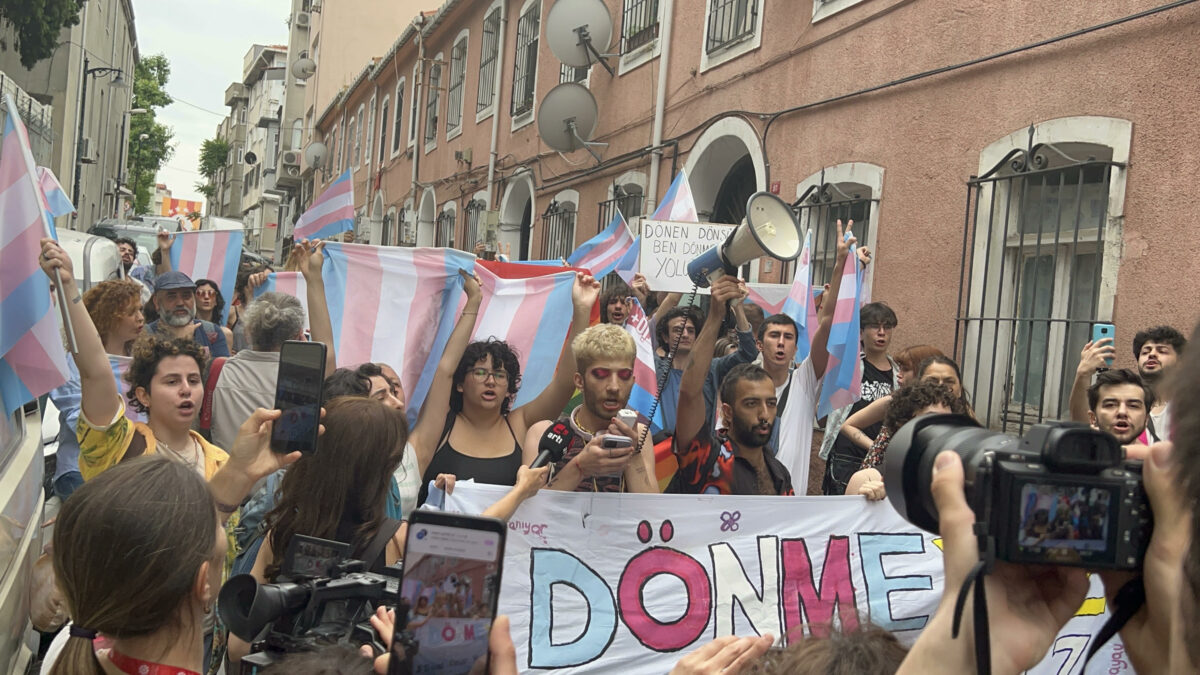
New changes from the Turkish authorities to the accessibility of hormones for trans people further threaten health and lives
On 20 November, the Turkish Medicines and Medical Devices Agency announced a new regulation that requires an e-prescription to access certain hormones used by trans people. The restrictions regulate access to hormones used mainly by trans masculine people as well as hormones used to treat diabetes. The two hormones under this new regulation used by trans women are also the same hormones used by cis women for birth control. This regulation therefore not only impacts trans people but also cis women and people with diabetes.
The new regulation exposes the pre-existing inadequacies in access of trans persons to healthcare services. While the regulation can be seen as an attempt to regularise the process of distribution and use of hormones, making the procurement and treatment safer for users, the Turkish healthcare system is extremely inaccessible for trans people, in particular as regards trans-specific healthcare. As a result, this new regulation will have severe consequences for trans people.
Currently in Turkey university research hospitals are the only hospitals that have specific gender transition councils which assess and provide a medical report for trans persons, which doctors then use to prescribe the necessary hormones. However, these hospitals are only available in 13 of the 81 provinces (usually those with major cities), resulting in those trans people living in rural areas having to travel to one of these 13 provinces. The journey time is usually long, and appointment availability is scarce, making such trips less affordable and accessible. For those who already live in major cities, it is still difficult to access the healthcare system as appointments are rarely available due to high demand – it can take several months to secure a first appointment. Subsequent appointments also have a similar waiting time. In total, it takes a minimum of six months to receive the necessary report for accessing hormone prescriptions. It is time and resource-intensive, and transphobia is often encountered along the way.
Hormones are a key part of trans-specific healthcare for many trans people – they impact not only physical traits but also frequently psychiatric health and wellbeing. For trans persons who have had their gonads removed, hormones are critical for good physical health, as stopping hormone therapy can lead to osteoporosis, among other things.
As a result, this new regulation will have severe negative consequences for the healthcare and mental health of trans people across Turkey, in particular trans masculine people and trans people in poverty. Many trans people will no longer be able to access these hormones, and some will even turn to unregulated pathways to procure them, which can result in health risks and exorbitant prices.
For such a prescription regulation to produce positive effects, the Turkish healthcare system needs to be restructured in such a way as to ensure that trans people can access healthcare in hospitals in all areas of the country. Trans-specific healthcare needs to be more widely provided and understood so that the current high demand can be met, with medical professionals ensuring the right to health of each patient, without discrimination.
More broadly, Turkey should uphold the case law of the European Court of Human Rights on legal gender recognition under Article 8. It should introduce a new legal framework that is quick, transparent and accessible with no requirements for invasive surgeries, and wide access to trans-specific healthcare. It should comply with the World Health Organisation’s 11th revision of the International Classification of Diseases which depathologises trans people in all areas of life.
Recent incidents of limitations on the right to freedom of assembly for LGBTI people in Turkey
On 20 November police blocked a demonstration to commemorate victims of transphobic violence in Ankara on the International Trans Day of Remembrance, and arrested four people, including a member of the Ankara Bar Assocation.
On 23 November police intervened in a demonstration by trans activists in Istanbul against the new e-prescription regulation, detaining 38 people. They were released after providing statements to the police.
On 25 November – The International Day for the Elimination of Violence Against Women – hundreds of people took to the streets in cities across the country, and were met with police repression in many cases. In particular, in Istanbul, the Governor’s Office banned all protests and demonstrations on the specified date, and police interventions resulted in 169 arrests. All of those arrested have since been released, apart from two LGBTI+ people from Azerbaijan, who were taken to repatriation centres. Due to the severe conditions and ill-treatment they were subjected to, including being deprived of food and medications, they were forced to “voluntarily return” to Azerbaijan. One of them was an LGBTI+ human rights defender from Azerbaijan who immigrated to Turkey due to being at risk of arrest in their country.
In Turkey LGBTI+ people are regularly subjected to arbitrary detention (often with excessive police force) and charged for participating in public events, or for holding rainbow flags in the public space. Public demonstrations are frequently banned or postponed under the pretext of “national security”, “public order”, “prevention of crime”, “protection of public health” or “public morals”, with police and governors excessive powers. These practices which include vague limitations on public assemblies allowing for arbitrary interpretation, breach Turkey’s own Constitution (Article 34) and the European Convention on Human Rights (Article 11) to which Turkey is party. Turkey should bring its practices in line with the ECHR and its own Constitution, halting arbitrary banning of protests and detention of participants.
Joint statement: EU Court of Justice strengthens trans rights by calling for the automatic recognition in birth certificates
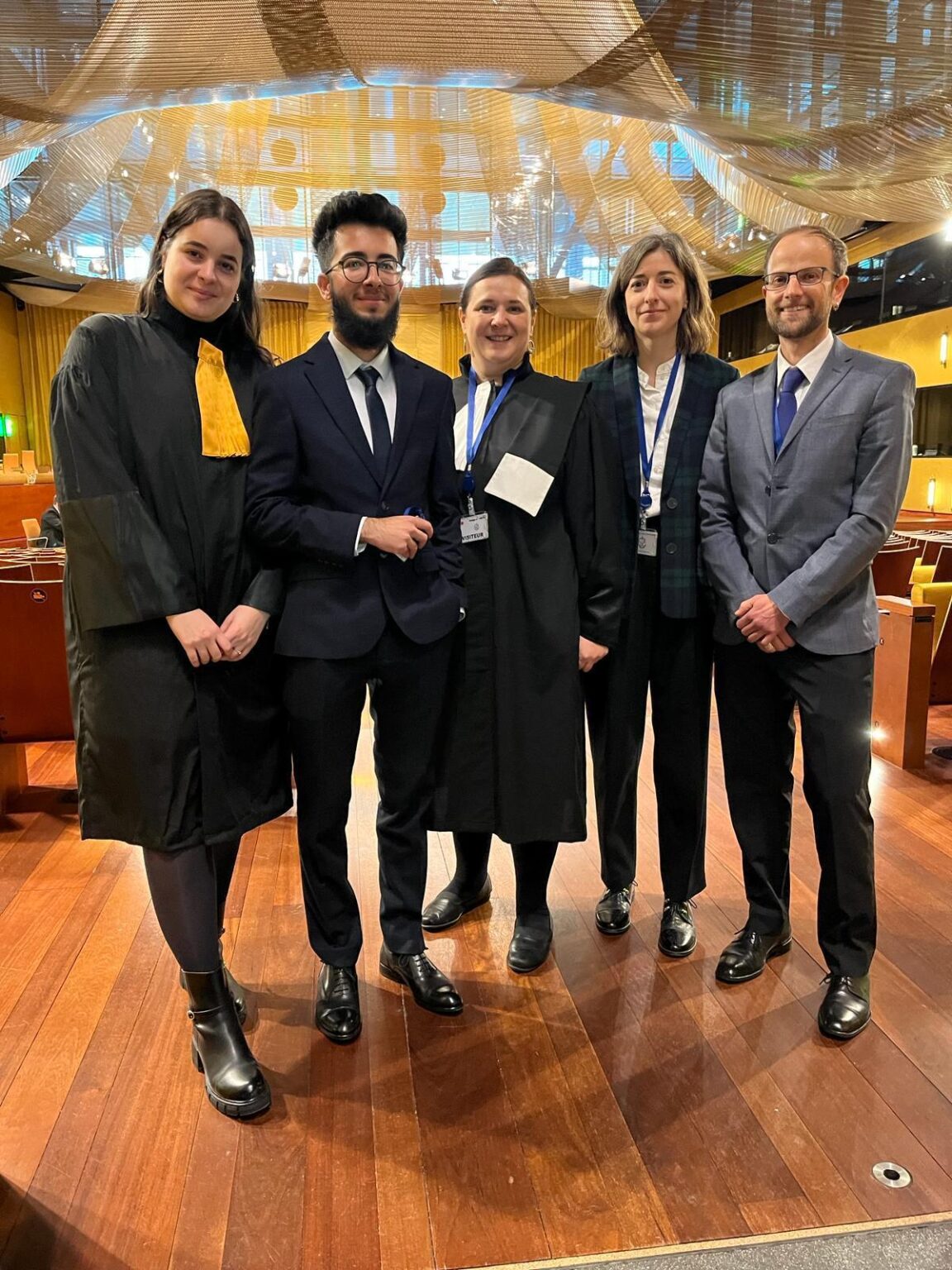
ACCEPT, TGEU and ILGA-Europe welcome today’s decision of the Court of Justice of the EU (CJEU) said that the refusal of an EU Member State to recognise changes of forename and gender acquired in another Member State is contrary to the rights of EU citizens.
The case C-4/23 Mirin concerns Arian Mirzarafie-Ahi, a Romanian trans man, with dual Romanian-British citizenship. Arian began the legal process to change his legal gender and name in 2017 and was granted a gender recognition certificate by UK authorities in 2020. At that time, the UK was in the Brexit transition period and still treated as a Member State of the EU. Subsequently, Romania refused to register the name and legal gender recognition of the applicant obtained in the UK and demanded that he go through Romania’s judicial legal gender recognition procedure. However, the European Court of Human Rights had already found that Romania does not have a procedure for change of name and gender marker that satisfies the standards of the European Convention of Human Rights (ECHR) of being quick, transparent and accessible.
The Romanian court asked the EU’s top court to clarify whether EU law required Romania to recognise another Member State’s decision acknowledging the name and gender marker of the applicant or if it could enforce its own procedures for legal gender recognition. In other areas of law, EU Member States commonly recognise each other’s decisions without further procedures. As such, this case marks a pivotal moment in addressing the mutual recognition of legal gender recognition decisions across EU Member States.
The CJEU Decision
The CJEU ruled in favour of Arian, stating that Romania must recognise the legal gender recognition granted in the UK. The Court emphasised that the refusal to acknowledge changes of forename and gender acquired in another Member State is contrary to the fundamental rights of EU citizens, particularly the principles of free movement and non-discrimination. The Court highlighted that mutual recognition of legal decisions among Member States is essential for upholding the rights of individuals within the EU, and that personal identity, including gender, is a fundamental element of one’s identity, protected under Article 7 of the Charter of Fundamental Rights and Article 8 of the European Convention on Human Rights. This landmark ruling reinforces the obligation of Member States to respect and recognise the legal gender identity of individuals as granted by other EU countries.
Impact
The importance of this judgement extends beyond the applicant’s individual circumstance, and underscores the broader issue faced by trans people whose legal gender recognition in one Member State is not acknowledged elsewhere in the EU, preventing them to travel freely, live, work or study across the EU, or even to vote, as any other citizen is able to. The judgement confirms the principle that rights legally obtained in one Member State must remain valid throughout the EU.
Reactions
According to Arian’s legal counsel, human rights lawyer Iustina Ionescu: “Today’s verdict has shown us that trans people are equal citizens of the European Union. When you have rebuilt a life in another part of the European Union because you are not welcome in your own country, it is normal to ask to be treated with dignity when interacting with the authorities in your home country. The fact that today the Court ruled on the mutual recognition of LGR decisions, no matter how different the procedures are in the Member States, should determine Romanian authorities to also adopt a fast, transparent and accessible national procedure, as requested by existing ECHR jurisprudence.”
TGEU Expert Advisor, Richard Köhler, said: “The CJEU’s ruling in the Mirin case is a monumental victory for trans people in Europe! Arian was forced to navigate a legal nightmare, facing the prospect of conflicting passports and demands for sterilisation to match his legal gender on Romanian and UK documents. Member States must recognise each other’s decisions—this is about equality and dignity. Romania, it’s time to act: Arian deserves his passport now, and the country needs a legal framework for recognising foreign gender identities.”
ILGA-Europe’s Senior Strategic Litigation, Marie-Hélène Ludwig added: “Today’s ruling confirms that without mutual recognition of legal gender recognition from one Member State to another, the right to freedom of movement and residence is not guaranteed for trans people in the EU. It is a great victory that shows the power of strategic litigation in the EU. This judgement will have an immensely positive impact, increasing legal protection for all trans people in the EU, all the more as certain EU countries like Romania still do not provide a legal framework for legal gender recognition conforming with European Court of Human Rights’ standards.”
Romanian NGO ACCEPT is a plaintiff in the case alongside Arian. TGEU and ILGA-Europe supported ACCEPT throughout the case, and joined Arian’s legal team at the Oral Hearing before the CJEU in January 2024.
Joint statement: EU Court of Justice Advocate General calls on Hungary to correct trans refugee’s gender marker in national registries

Háttér Society, ILGA-Europe and TGEU welcome an opinion from the Advocate General of the Court of Justice of the European Union stating that Hungarian immigration authorities must correct the gender marker of a trans person in its national immigration registries upon request.
Today, the Advocate General of the Court of Justice of the European Union (CJEU) has issued an opinion on the case of Deldits (C-247/23) calling on Hungary to correct the gender marker of the applicant in the national immigration registry upon request.
The opinion specifically relates to the case of a trans refugee in Hungary who has been denied legal gender recognition (LGR) in the asylum register since 2021. Represented by Háttér Society and the Hungarian Helsinki Committee, the complainant, who was granted refugee status in Hungary in 2014, has sought the rectification of his gender marker and name (as it reflected his sex at birth) on the national registry under Article 16 of the EU’s General Data Protection Regulation (GDPR).
This case raises crucial questions for the CJEU: whether the GDPR mandates the rectification of the gender marker on national registries upon request, and if so, does this request require evidence? If so, does it need to include proof of surgical intervention?
Advocate General Collins stated that following Article 16 GDPR in conjunction with Article 5(1)(d) GDPR Hungarian authorities need to rectify the gender of the applicant, whose data they recorded inaccurately in the first place. He also pronounced that while evidence might be requested, proof of surgical intervention cannot be required.
This case marks a pivotal moment in the ongoing battle for the rights of trans people in Hungary. The 2018 Constitutional Court decision and the 2020 European Court of Human Rights judgment affirmed the right of trans refugees to legal gender recognition. Nonetheless, the Hungarian legislature has not implemented the necessary changes. Hungarian citizens have not had access to LGR since May 2020, whilst refugees never had access to such recognition.
Eszter Polgári, Director of the Legal Program at Háttér Society, emphasised the potential implications of a ruling in line with the opinion: “The preliminary ruling reflecting the Advocate General’s opinion might have an impact beyond the specific case, as a positive decision of the Court of Justice of the European Union will hopefully force the legislator to reconsider the procedure on legal gender recognition also for Hungarian citizens, and bring it in line with international human rights and EU law, including the relevant provisions of the GDPR.”
TGEU Expert Advisor, Richard Köhler, adds: “Respect and recognition matter for everyone. For many trans people it is a significant step to living fulfilling lives. The Advocate General’s opinion is a substantial move towards EU Member States finally recognising their responsibility to introduce proper legal gender recognition procedures for all trans people.”
ILGA-Europe Senior Strategic Litigation Officer, Marie-Hélène Ludwig, said: “This opinion is a significant development for the rights of trans people in the EU, including refugees, particularly in countries still deprived of any legal framework for legal gender recognition, in breach of their international obligations. We are looking forward to the judgment confirming Member States’ obligation to record correct gender markers in all national registries.”
The Advocate General at the Court of Justice of the European Union offers independent, expert legal opinions on cases to guide the judges in making their final decisions.
The CJEU’s decision is expected at the beginning of 2025. It holds significant potential to influence the legal protections for trans people within Hungary and across the EU.
ILGA-Europe and TGEU – Trans Europe and Central Asia are providing support to Háttér Society in this case.
What European countries might soon start recognising non-binary people?

Interested in the current state of non-binary rights in Europe? This concise guide covers the most important updates and developments you should be aware of
Current situation
As of 2024, only a few European countries officially recognise non-binary gender markers. Iceland and Germany lead the way, allowing non-binary people to have their identities legally acknowledged. Denmark and Malta partially acknowledge non-binary identities, though issues remain, particularly in areas like the healthcare sector. You can read more about it in one of our previous blogs. However, progress is slow, and many countries still lack comprehensive legal frameworks for non-binary recognition.
Which countries are next?
France and the SNCF case: potential impact across the EU
Last Thursday (July 11, 2024) the Advocate General of the Court of Justice of the European Union (CJEU) gave his opinion that France’s national railway company SNCF should stop forcing passengers to choose between the civil titles “Mr” or “Ms” when purchasing train tickets. This landmark case, brought by Association Mousse, could set a precedent similar to the Deutsche Bahn case in Germany across the European Union.
In his opinion, which was published earlier this week, the Advocate General of the CJEU said that it is not “necessary” and that it is therefore unlawful for the SNCF to collect individuals’ civil titles. The Advocate General also agreed with Association Mousse that processing data on civil titles creates a risk of discrimination on the grounds of gender identity for trans and non-binary people notably as other States legally recognise non-binary identities.
Should the CJEU’s judgement align with the opinion of the Advocate General, all organisations collecting gender markers would be forced to stop doing so when it is not necessary for the service provided. The outcome has the potential to influence broader European standards for non-binary recognition, emphasising the role of strategic litigation in advancing rights.
Belgium’s legal hurdles
Belgium’s journey towards non-binary recognition has faced significant setbacks. In 2019, the Belgian Constitutional Court declared the existing laws discriminatory towards non-binary people. The government proposed removing gender markers from ID cards entirely, but this reform has stalled due to political and technical challenges. Despite these obstacles, there are plans to eventually implement these changes.
Italy on the verge of change
Italy is also nearing a significant decision. The Italian Constitutional Court is expected to rule on the inclusion of a third gender marker. This ruling could trigger legislative changes, inspiring other countries to follow suit and potentially transforming the landscape of non-binary rights in Europe.
Legal battles play a pivotal role in the fight for non-binary recognition. Cases like the ones in France and Germany highlight how litigation can drive change even when legislative processes are slow. These legal battles and proposed reforms are part of a broader movement toward inclusivity and respect for non-binary identities across Europe.
Beyond laws: the experience of being a non-binary person in EU
The third EU LGBTIQ survey report, published in June by the European Union Fundamental Rights Agency (FRA) offers some insights into non-binary lives. Almost 20% of respondents identified as non-binary, yet more than 90% do not have their identity legally recognised. When delving into the reasons behind this, it becomes evident that non-binary people face unique challenges and perspectives.
The reluctance or perceived lack of necessity for legal gender recognition (LGR) among non-binary people is often due to the accessibility and relevance of existing LGR frameworks. These frameworks typically do not include non-binary options, which discourages non-binary people from pursuing LGR.
For instance, while nearly 60% of trans women and men intend to seek legal gender recognition in the future, only 17% of non-binary respondents share this intention. This disparity suggests that non-binary people might not see current LGR options as applicable or beneficial to their identities, especially considering the potential discrimination they might face in the process.
Additionally, safety concerns significantly impact the daily lives of non-binary people. The FRA data revealed that 23% of non-binary people frequently hide their gender identity for safety reasons, a higher percentage compared to 10% of trans men and slightly more than trans women at 20%. This heightened sense of vulnerability underscores the pressing need for legal recognition and protection.
What do non-binary people want from the law?
Despite developments in Europe and farther afield, we still have relatively little data on what non-binary people want from the law and how they are currently experiencing different legal systems. This is something which ILGA-Europe, along with other civil society partners and a team of academics, will be looking to explore over the coming year. By understanding and addressing the specific challenges faced by non-binary people, we can better advocate for their rights and recognition across Europe.
Here is a list of useful resources for policy-makers and activists on the topic of non-binary rights:
- Rainbow Map: Legal gender recognition
- Human Rights and Gender Identity and Expression: Issue Paper by the Council of Europe Commissioner for Human Rights
- Non-binary gender registration models in Europe: Report on third gender marker or no gender marker options by Lena Holzer for ILGA-Europe
- Intersections – Diving into the FRA LGBT II Survey data: Trans and non-binary briefing by ILGA-Europe and TGEU
Joint Statement: European Court confirms requirement for legal gender recognition in Bulgaria despite rejected complaint

TGEU, ILGA-Europe, Bilitis, and the Bulgarian Helsinki Committee welcome the European Court of Human Rights’ confirmation of Bulgaria’s obligation to provide for reliable legal gender recognition. However, we regret that the Court found the individual complaint to be inadmissible.
On 4 July 2024, the Court published its decision on the revision of the Y.T. v Bulgaria case, which was originally decided in 2020. While the Court concluded that the applicant had failed to inform the Court at the time of his success in obtaining legal gender recognition from another Bulgarian court and therefore retroactively found the case to be inadmissible, it still emphasised that Bulgaria is obliged to set up a robust legal framework for legal gender recognition (LGR), as confirmed in the later case of P.H. v Bulgaria (2022).
It is important to point out that the applicant had followed the rules and exhausted all domestic remedies in one set of proceedings and he was unable to obtain LGR. Considering the importance of having his identity documents match his gender identity, in the circumstances where timely remedy from the Court was not clear, the applicant then resorted to seeking LGR through other courts. While the applicant eventually successfully achieved LGR, the overall process proved that there is a lack of a quick, transparent and accessible procedure in Bulgaria.
The Court also indirectly criticised a decision from the Bulgarian Supreme Court of Cassation that effectively bans legal gender recognition for anyone in the country.
Member of the jury, Judge Šimáčková issued a remarkable dissenting opinion. She focused on both the human impact on the individual and the systemic failings of the Bulgarian government to remedy the situation.
TGEU, ILGA-Europe, Bilitis, and the Bulgarian Helsinki Committee jointly intervened in the case at the time and informed Council of Europe supervision authorities of the systemic failure of Bulgarian authorities to provide for legal gender recognition.
Our organisations express deep concern over Bulgarian authorities’ priorities. Instead of addressing the underlying human rights violations, the government decided to invest in having this judgement overturned. This does not change the situation at hand and does not relieve Bulgaria from its obligation to rectify it.
The situation for trans people seeking LGR in Bulgaria is dire. 94% of trans respondents from Bulgaria said they had not changed their legal gender. Whereas, 26% would like to do so in the future. 39% said that changing legal gender was not possible in their country, according to the 3rd FRA LGBTI Survey from 2023.
In 2023, the Council of Europe Committee of Ministers (CoM ), the supervising authority in the case, expressed deep regret over the lack of action by the Bulgarian authorities to rapidly elaborate legislative amendments introducing a Convention-compliant procedure for legal gender recognition. Taking into account the gravity of the situation and the uncertainty faced by trans people in Bulgaria who want to obtain LGR, the CoM exceptionally requested Bulgarian authorities to consider the possibility of adopting interim measures to allow legal gender recognition.
Background
In the original case, Y.T., a trans man from Bulgaria, had challenged the inability to change his name and gender marker in Bulgaria before the Court in 2016 as a violation of his convention rights. In 2020, the ECtHR found that Bulgaria breached the applicant’s right to private life, as protected under Article 8 ECHR, and confirmed that there is no system in Bulgaria in place for adapting documents corresponding to CoE standards (quick, transparent, accessible).
Y.T. is a “leading case” as it pointed out a systematic problem. In another “repetitive” case, P.H. v Bulgaria, the Court confirmed its findings from Y.T.
In December 2023, the Bulgarian government requested a revision of the Y.T. case as the applicant had been able to receive legal gender recognition before another Bulgarian court while the European Court of Human Rights deliberated on the case.
Four years after the original decision in Y.T., the Bulgarian government has still not implemented a process that ensures trans people have access to quick, transparent and accessible legal gender recognition procedures.
On the contrary, in February 2023, the Bulgarian Supreme Court of Cassation ruled that legal gender recognition is not possible in the Bulgarian legal framework.
During the implementation process, no visible signs of progress or political will are detectable.
The dissenting opinion
In her remarkable dissenting opinion, Judge Šimáčková, empathises with the human cost and the systemic adverse situation for trans people in Bulgaria. She critiques an over-formalistic and rigorous assessment by her fellow judges. She points out that the applicant was in a very distressing situation and fought not only for himself but for others in a similar situation in the country. Moreover, the applicant should not have been punished for formalistic reasons that the responsible legal representative should have known. She suggests that the Court could have instead reduced the compensation awarded to the individual and reviewed the relevant legal framework, which had at first been patchy and since 2022 completely inhibiting legal gender recognition.
More info
Find out more about the original case: https://tgeu.org/third-party-intervention-in-y-t-v-bulgaria-case/
2024 Decision in Revision in Y.T. v Bulgaria: https://hudoc.echr.coe.int/?i=001-234521
2020 Original decision in Y.T. v Bulgaria (french only): Y.T. c. BULGARIE (coe.int)
Joint submission in the implementation process of Y.T. v Bulgaria: https://hudoc.exec.coe.int/?i=DH-DD(2023)1015E
Learn about the situation of trans people in Bulgaria here and here
European court hears landmark case on trans rights in Hungary
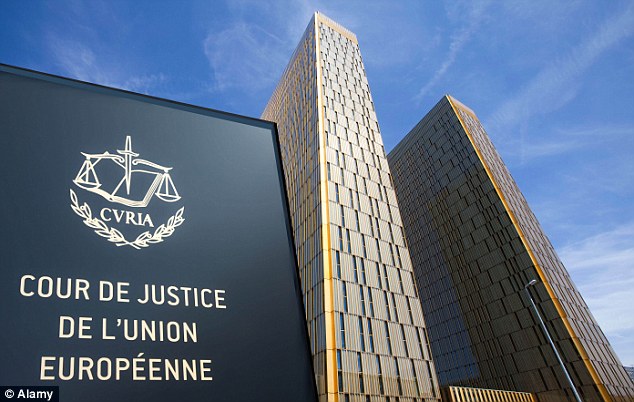
The Court of Justice of the European Union held a significant hearing today concerning legal gender recognition for trans people in Hungary
Today, the Court of Justice of the European Union (CJEU) heard the case Deldits (C-247/23), which involves a trans refugee in Hungary who has been denied legal gender recognition (LGR) since 2021. Represented by Háttér Society and the Hungarian Helsinki Committee, the complainant, who was granted refugee status Hungary in 2014, has sought judicial review under Article 16 of the EU’s General Data Protection Regulation (GDPR).
This case raises crucial questions for the CJEU: whether GDPR mandates the rectification of personal data, including gender marker, upon request; what evidence is necessary to support such requests; and whether medical or surgical interventions must be proven.
In addition to the European Commission and advocacy groups, the governments of Hungary, France, Spain and the Netherlands participated in today’s hearing, highlighting its broader implications for LGR in Hungary.
The Budapest-Capital Regional Court’s referral to the CJEU marks a pivotal moment in the ongoing battle for trans rights in Hungary. Despite the 2018 Constitutional Court decision and the 2020 European Court of Human Rights judgement affirming these rights, the Hungarian legislature has yet to implement necessary changes. LGR for both refugees and Hungarian citizens has been banned since 2020.
According to Katrin Hugendubel, Advocacy Director at ILGA-Europe: In its final judgment, the CJEU will have the opportunity to address the discrimination faced by trans EU citizens when a gender marker that does not correspond to their gender identity is recorded in the national registrars. The case is of the utmost importance to protect the rights of trans citizens in Hungary and across the EU, notably in the context of the Hungarian ban on legal gender recognition.
The opinion of the Advocate General is expected on 12 September 2024. The CJEU’s decision is anticipated later in the autumn, and it holds significant potential to influence the legal framework for trans rights within Hungary and the broader EU.
ILGA-Europe, alongside Transgender Europe (TGEU), are providing support to Háttér Society in this case.
Read the press release by Háttér Society here.
EU Court of Justice Advocate General calls for automatic recognition of legal gender recognition in birth certificates

An opinion from the Advocate General of the Court of Justice of the European Union states that documents received in the UK by Romanian trans man must be recognised in his home country.
In a significant development regarding the rights of trans people in the European Union, the Advocate General of the Court of Justice of the European Union (CJEU) has issued an opinion calling for the automatic recognition in birth certificates of new name and gender marker acquired in a Member State.
The opinion specifically pertains to the case of Arian Mirzarafie-Ahi, a trans Romanian man facing his home country’s authorities’ refusal to recognise in his birth certificate his new gender marker, acquired further to his legal gender recognition in the United Kingdom.
Advocate General Jean Richard de La Tour said it was imperative that the Romanian state record in his birth certificate entries related to his name and gender without additional procedures. This recognition, argued the Advocate General, is essential in upholding the rights to free movement and private and family life guaranteed by the European Union.
Arian’s case, supported by the ACCEPT Association, ILGA-Europe and TGEU, marks a pivotal moment in addressing the mutual equivalence of legal gender recognition (LGR) procedures across EU Member States.
The refusal of authorities in Romania to recognise Arian’s UK-issued identity documents has left him in a precarious situation, living with two different identities. Despite being a citizen of the European Union, Arian’s ability to exercise his freedom of movement and his right to private and family life is hindered by the lack of recognition of his true identity in his home country. This discrepancy exposes him to discrimination and humiliating treatment, particularly at border crossings.
Expressing anticipation for a favourable judgment from the CJEU, Arian emphasised the significance of having his identity accurately represented in official documents. “The favourable judgment of the CJEU is extremely important for me and many other Romanian and EU citizens,” he said. “It is about respecting a fundamental civil right. I am Romanian, I am in the European Union, I am trans. My documents must represent me and be updated.”
The importance of this case extends beyond Arian’s individual circumstances. It underscores the broader issue faced by thousands of individuals whose rights are compromised due to disparities in identity recognition among EU Member States. The opinion of the Advocate General reinforces the principle that rights legally obtained in one Member State must remain valid throughout the EU.
In response to the Advocate General’s opinion, Katrin Hugendubel, Advocacy Director at ILGA-Europe, added: “The AG opinion confirms what we have been pointing out for EU institutions for quite some time: without mutual recognition of legal gender recognition from one member state to another, the right to freedom of movement is not guaranteed for trans people in the EU. We are looking forward to the judgement confirming this opinion and urge the European Commission yet again to put forward legislation that will guarantee the freedom of movement for all LGBTI people under its next term. The EU directive on parenthood recognition is a very important piece of the puzzle to ensure the freedom to reside and move across the EU for LGBTI people, but more is needed to ensure that trans people can move freely across the EU and enjoy citizenship rights on equal footing with every other citizen of the EU.”
As the CJEU deliberates on this case, there is a collective hope that the judgment will align with the opinion of the Advocate General and ensure the automatic recognition of Arian’s legal gender recognition in the corresponding entries of his birth certificate by the Romanian state. However, we hope that the Court will not take into account in its judgment the questions of “marriage and parentage” emphasised by the Advocate General in his Opinion, which are not at stake in Arian’s case.
Romanian transgender man’s landmark case requesting that Romania acknowledges his UK gender recognition referred to the Court of Justice of the European Union

Arian Mirzarafie-Ahi, a transgender man with Romanian and British citizenship, has filed a first-of-its-kind lawsuit in Romania against Romanian authorities over their refusal to recognize his new male name and gender identity acquired in the United Kingdom (while still treated as an EU Member State). The lawsuit, which raised fundamental questions under EU law, has now been referred to the Court of Justice of the European Union (CJEU) in Luxembourg.
ACCEPT Romania, a leading Romanian NGO for LGBTQ+ rights, is helping Arian bring this landmark legal claim before the CJEU to have his new gender identity acknowledged in Romania, in accordance with his free movement and citizenship rights.
Arian began the legal process to change his gender identity markers and name in 2016. He was ultimately granted a gender recognition certificate by the UK authorities in 2020, during the Brexit transition period (when the UK was still treated as an EU Member State).
Romania now refuses to acknowledge the name and gender recognition that Arian received in the UK. Instead, it is demanding that Arian undergo Romania’s own gender recognition procedure, which has already been found to violate the European Convention on Human Rights. As a result, Arian now finds himself with two different identities across two countries, which has impacted his well being, his freedom of movement, and his EU citizenship rights.
This situation is humiliating and deeply affects Arian’s right to dignity under the Universal Declaration of Human Rights and the European Convention on Human Rights. Arian’s ability to travel freely in the EU, like any EU citizen, has been unjustifiably restricted, including his ability to visit family members in Romania, because his Romanian passport displays the wrong identity.
Arian’s case is the first of its kind to reach the European Courts. He hopes the CJEU will side with him and rule that the Romanian authorities should acknowledge his UK gender recognition and issue him new identity documents with the correct name and gender, without subjecting him to the full Romanian gender recognition procedure.
This case could set a precedent for other transgender people whose gender recognition in one Member State is not being acknowledged elsewhere in the EU, harming their ability to travel freely, reside, work or study across the EU, or even to vote.
The Court will also have the opportunity to confirm that the rights that EU citizens lawfully acquired in the UK when it was still treated as a Member State, such as Arian’s gender change, are portable when those citizens wish to exercise their free movement rights.
Arian and ACCEPT are represented by human rights lawyer Iustina Ionescu and assisted by leading international law firm White & Case on a pro-bono basis.
The facts of this case are as follows.
Background to the case
Arian was born in Romania and migrated to the UK in 2008, and later gained dual citizenship. He started the medical and legal transition in the UK in 2016 at the age of 24, and obtained a UK gender recognition certificate in June 2020, when the UK was still treated as an EU member state.
Arian attempted to register his name and gender change with the Romanian authorities in 2021, but his request was denied. Instead, the Romanian authorities demanded that Arian undergo the full Romanian gender recognition procedure before the national courts. That procedure has already been found to be in violation of human rights by the European Court of Human Rights (X and Y v Romania).
Arian then filed lawsuits in the Romanian national court against the Directorate for the Persons’ Records in Cluj, Romania; against the Civil Status Service, the Directorate for the Persons’ Records and the Administration of Databases and against Cluj Municipality represented by Emil Boc, over their refusal to change his identity documents through a simple administrative procedure.
Through this legal action, Arian is requesting that the national courts oblige the Romanian authorities to change his gender and first name, as well as to issue a new birth certificate.
Before Brexit, Arian could have travelled based on his British passport that reflects his gender identity. However, since Brexit, he can exercise his EU citizen rights only through his Romanian identity documents, which do not reflect his gender identity.
Alongside this breach of Arian’s fundamental rights, especially his right to free movement and residence in the EU, this disparity between his Romanian and British documents exposes him to humiliation and discrimination.
Arian has to travel to the EU with a Romanian passport that reflects neither his gender identity nor his appearance, or must travel on his UK passport as a non-EU citizen.
Considering that Arian’s case raises new issues of principle requiring the interpretation of EU law, in particular in relation to free movement rights and EU citizenship, the Romanian court has decided to refer the case to the European Court of Justice for a preliminary ruling. After hearing the parties, both in writing and orally, the Court of Justice will render a judgement that will be binding on the Romanian courts and throughout the EU.
Quotes
Arian said: “My entry into Romania’s territory, the country where I was born and where I have family members that I want to visit, depends on a set of identity documents that do not reflect who I am.
Due to the Romanian State’s refusal to recognise my gender identity and issue updated documents, I have already been a victim of discrimination at Romanian airports.
“All that I want is to be respected as a Romanian and European citizen and to have my Romanian identity documents updated, just as my UK documents were when I transitioned. I want to be able to enjoy all my rights, but especially my right to dignity.”
His lawyer, Iustina Ionescu, said: “The Romanian state once again violates European law and disregards the efforts made by a Romanian citizen to obtain the recognition of his gender identity in another EU Member State.
“For over a year and a half, the Romanian civil status authorities have sent Arian on a fool’s errand – they have forced him to once again go through a procedure that is entirely random in Romania, and that has already been declared by the ECtHR as violating human rights, and that does not guarantee him a solution of the situation.
“Before being European citizens, we are Romanian citizens, and the state should do its duty towards all its citizens. Fortunately, we can turn to European justice to ensure that we receive equal treatment without discrimination. The European Court of Justice has ruled many times that EU member states should refrain from taking decisions that restrict free movement and the rights of EU citizenship, as Romania did in this case.”
Florina Presadă, executive director of ACCEPT, commented: „ACCEPT Association has been working for years to put an end to the discrimination and abuse that the Romanian state subjects transgender persons in Romania by not providing a legal gender recognition procedure and all services required so that transgender persons can exercise their right to self-determination.
We have been providing legal counselling, psychological support and guidance in transition for years for transgender Romanian citizens, and we have also supported strategic litigation cases in order to show, beyond any doubt, that the rights of transgender persons in Romania are being violated. Our goal is to put an end to the current laws, policies and practices leading to the discrimination of transgender persons.
We stand by Arian, as we stand by every transgender person in Romania and in any other EU member state that does not recognize these persons’ rights to self-determination and dignity. We hope this ruling will show that European rights are for everyone, regardless of gender identity or expression.”
Patrick Brăila, trans activist, declares: “Among the Romanians who left for other European countries for a better life, there are also transgender Romanians who work and live in these states, where they managed to obtain citizenship and which became their adoptive countries. One of them is Arian, a Romanian and British citizen, whom the Romanian state humiliated and wronged when it did not recognize his identity and put him in abusive and intrusive situations. We trust that the CJEU will give him justice, thus restoring the dignity of both him and other trans people who know that their rights as European citizens can no longer be violated.”
“To paraphrase Ursula von der Leyen, if you are trans in one member State, you are trans in all member States. This needs to be settled once and for all,” comments Lenny Emson, TGEU Executive Director. “Having to go through the ordeal of having your gender identity vetted several times is unfair and puts trans people at a clear disadvantage when compared to others living in the EU. Romania, in particular, has no quick, transparent, and accessible legal gender recognition procedures, as confirmed by the European Court of Human Rights. We are proud of Arian for claiming his right to enjoy his EU right to freedom of movement.”
Katrin Hugendubel, Advocacy Director at ILGA-Europe added: “This case is just one example of what trans people in the EU have to go through when their gender recognition from a Member State is not recognised in another, forcing them to undergo the full legal recognition procedure again. This is particularly difficult and troubling in those countries that lack an LGR procedure in conformity with international human rights law standards. This judgment from the CJEU will establish a clear obligation to recognise gender recognition from one Member State in another. It will rightfully enable trans people to move freely across the EU, and to enjoy EU citizenship rights on equal footing with everyone else.”
For further information and interviews, please contact Diana Dragomir, Head of communication & PR ACCEPT Romania at diana@acceptromania.ro or Florina Presadă, Executive Director of ACCEPT Romania at florina@acceptromania.ro.
For good and bad: The trending impacts on LGBTI human rights in Europe and Central Asia

The most striking finding of ILGA-Europe’s Annual Review 2023 is a stark rise in the ferocity of anti-LGBTI hate and violence reported in Europe and Central Asia. But alongside this worrying trend, there are positive developments in areas such as legal gender recognition, public support, intersex human rights and civil society. Here are the key highlights.
At ILGA-Europe we’ve just published our Annual Review, showcasing the main developments and trends in the human rights Situation for LGBTI people in Europe and Central Asia. Disturbingly, the most striking finding this year is the levels of hate reported in the region. 12 years into this yearly reporting, the present edition finds that anti-LGBTI violence in 2022 was more targeted and extreme than ever in the history of our reporting.
Our Annual Review aims to paint a clear picture of the reality from the ground for our communities. It documents individual cases and events, as well as legislative, social and political advancements and regressions, and new available data. All reporting is based on the work of LGBTI activists in each country featured in these pages, as well as on our own work.
While the review points to the devastating consequences of the instrumentalisation of LGBTI people, mostly for political gain, there have been other developments in the direction of human rights and protection of LGBTI people.
We have not seen this severity of the violence before
For years, ILGA-Europe has been documenting the rise in hate while activists across the region have shown how anti-LGBTI speech, both online and by political and religious leaders, translates into violence harming people.
This phenomenon is across the board in this year’s Annual Review. For example, in France, the Ministry of Interior reported a 28% rise in hate crimes between 2020 and 2021. In Switzerland, LGBTI organisations reported a 50% increase between 2020 and 2021. Spain reported a 68% increase in 2021, while in England and Wales transphobic incidents rose by 56%.
There are also more reports than ever before of LGBTI people taking their lives, a clear sign how discrimination, hate speech and harassment are impacting mental health. In Italy, three trans women took their lives. Two of them were teenagers, the third woman was a teacher, who was suspended from school because she had socially transitioned. In Armenia, a young gay couple committed suicide after suffering harassment when a photo of them kissing went viral. These are just a few examples.
Sexual education is increasingly compromised
Education is a growing battleground in the resistance to LGBTI people and rights. In Hungary, as result of law banning LGBT content, teachers reported a fear of bringing sexual orientation, gender identity and other topics to the classrooms. In the Netherlands, 36 orthodox schools require anti-LGBTI declarations from pupils and parents, and the new Italian Prime Minister, Giorgia Meloni has publicly advocated for a ban on sex education in schools and the exclusion of LGBT people in children’s books.
Russia expanded its ‘propaganda law’ to prohibit positive and neutral information about LGBT people and “gender reassignment” to minors and adults. There was an alarming number of ‘propaganda’ charges or threats in educational establishments in the country. All in all, progression on sexual education is being challenged.
Public support for LGBTI people is growing
In parallel, the report finds growing support among societies for LGBTI people, also in countries where we might not expect it. For example, most Hungarians don’t consider ‘homosexual propaganda’ an important issue. In Poland, two thirds of the population support marriage equality and 60% support the abolition of anti-LGBT resolutions in the country.
What’s more, many politicians across Europe have shown their support throughout 2022. Many reacted with horror to the killings in Oslo and Bratislava and the European Parliament has publicly condemned the violations of LGBTI rights. We need more governments standing strong against hate in the media and online and more progress in advancing laws against hate crimes that protect LGBTI people.
There are more legal gender recognition laws that include self-determination
In the face of enormous backlash on trans people, and a number of forces trying to stop legal gender recognition (LGR), some countries made progress in 2022 and others showed a will to ensure a model of LGR based on self-determination.
Scotland, Finland and Spain were the best examples; by adopting LGR laws that include self-determination, these countries are showing a clear way forward for other governments.
Same-sex partnership is back on the agenda
After stagnating for a number of years, same-sex partnership recognition is on the rise again. Andorra adopted legislation to ensure heterosexual marriage and the recognition of same-sex civil partnerships guarantee the same set of rights. In Latvia, following a Supreme court decision ruling that same-sex couples should be given civil status, same-sex couples were recognised in court cases. Slovenia and Switzerland adopted marriage equality, including positive changes regarding adoption rights. Other countries took steps forward the adoption of laws that recognise same-sex partnerships.
While intersex human rights are rightfully taking a space in the agenda
There is also a growing awareness of intersex human rights across Europe. While Greece adopted a ban on non-vital medical interventions on children, the European Commission conducted surveys and interviews for the first EU study on the lives of intersex people and their parents (expected to be published this summer). The Council of Europe is preparing a Recommendation on intersex human rights while the Chair of European Commission against Racism and Intolerance and PACE General Rapporteur for the rights of LGBTI people shared supportive statements.
Behind every positive development, there are LGBTI activists doing hard work
LGBTI organisations and activists across our region are key to all the advances on LGBTI people’s rights and the support to their communities during 2022.
Despite difficult circumstances, more and more Prides are being organised, support for the most vulnerable in the community is provided and work with institutions and policy makers continues advancing LGBTI people rights.
More and more organisations report covering for gaps in service provision, and providing services where the community does not feel safe to access mainstreaming services, for example when it comes to shelter.
The most remarkable support was that of the LGBTI community in Ukraine through LGBTI organisations, as well as the support by activists across Europe for Ukrainian LGBTI refugees.
LGBTI activists are the central players in countries where progress has been made, as we’ve seen in Spain and Finland, where huge effort went into successfully keeping self-determined legal gender recognition on the right political track, despite fierce opposition.
The Annual Review of the Human Rights Situation of LGBTI People in Europe and Central Asia is published every February, as part of our Rainbow Europe package. We thank all those across 54 countries who worked with us to make sure our reporting was accurate.
Find out what’s been happening in your country here.
Progress in Legal Gender Recognition measures is slow, Council of Europe report says

Depathologisation, family rights and access to legal gender recognition for minors are among the key steps that national governments must take to advance the rights of trans people, according to a new Council of Europe report.
LGBTI people’s rights, including the concept legal gender recognition (LGR), are adequately protected in many European countries, but there are significant differences, a recent Council of Europe report reveals. 38 countries out of 46 Council of Europe members have LGR procedures in place, out of which nine are based on self-determination. However, in others there are no clear procedures, while some have even rolled back existing protections, leaving trans people at risk of violence and discrimination while their documents do not match their identities.
While the report acknowledges advances in legislation, practices and public attitudes, progress is slow and key actions are needed to depathologise trans people, to protect their relatives from abusive measures, and to ensure access to LGR procedures for minors.
Here are the key findings:
Depahologisation of gender recognition procedures is urgent
Shocking as it may sound, 13 European countries still require the sterilisation of trans people who want to follow an LGR procedure. This is contrary to the European Court of Human Rights case law, as is demanding medical diagnosis, which 26 countries still do. Finally, there is limited progress in ensuring that being trans is not a mental illness, as well as addressing other issues.
Married trans people should not be forced to divorce
In 19 member states, married trans people must divorce if they want to access LGR. Trans people are forced to choose between their marriages and their identities because of this requirement, which also has an adverse impact also on their spouses and children, as they will lose family-based rights.
This said, there are positive developments: in six countries being single is not a requirement to access LGR and in nine others marriage certificates are updated accordingly.
The best interest of the child should come first
LGR is accessible to children and teenagers in 17 Council of Europe member states. The best interest of the child principle should come first when reviewing limits in age, instead of discussions on the maturity of the applicants. When young trans people cannot access LGR, they are at risk of discrimination.
What about non-binary, gender-diverse and intersex people? What about non-nationals?
The Council of Europe encourages member states to learn from each other and to review the necessity of including gender markers in official identity documentation with regard to non-binary, gender-diverse and intersex people. As for making LGR accessible to non-national residents, the European Court’s case law may provide guidance when re-evaluating existing restrictions.
Other important recommendations
In the report, the Council reminds that equal treatment laws should come along with equal policy measures and regular monitoring. Countries who have no anti-discrimination legislation are encouraged to introduce it, marking gender identity and sex characteristics as grounds for aggravating circumstances.
Right now, just three European countries recognise non-binary identities, but others are pushing forward

M/F/X/Other: Do you know what non-binary gender markers can be registered today in Europe? To mark International Non-Binary People’s Day, we commend the countries that have introduced the registration of gender markers other than male or female, who using no gender markers at all in their official documentation, and those who are working to adapt their systems to recognise non-binary identities in the near future.
Allowing for non-binary gender markers in official documents is primarily an issue of accuracy, privacy, and respect for a person: non-binary people who must choose between only ‘male’ or ‘female’ gender markers are unable to have their documents match their identities, and as a result are often exposed to privacy violations because of assumptions about their sex assigned at birth.
When your government does not acknowledge or respect who you are, the psychological consequences can be significant. A major survey this year of LGBTI people, conducted by the EU Agency for Fundamental Rights (FRA), indicated that over 50% of trans respondents identified somewhere outside of the binary, while in the EU Trans Study, released in June 2020, one-quarter of the respondents who had not changed their legal gender said that the gender marker they needed were absent. Public opinion is also moving toward supporting non-binary markers: 46% of respondents to the 2019 Eurobarometer supported a third gender marker.
However, right now only three European countries recognise non-binary identities while three others have taken active steps to do so. As this forward trend continues, we hope more and more countries will join the push forward.
Iceland
Since 2019, Icelandic given names are no longer male or female in the national registry, thanks to the Gender Autonomy Act. Moreover, Icelanders registering their gender as “X” can take gender neutral family names meaning “the child of” instead of surnames designating an individual as someone’s son or daughter. However, this option is not available to those registered as male or female.
Germany
The category “divers” was introduced on driving licenses, birth certificates and other official documents in 2019, thanks to the efforts of activists and in particular, Vanja, a German citizen whose demands to be officially registered as “other” were rejected until 2017. However, this third gender category is technically only available only to intersex people who provide a medical certificate at the moment, which means it excludes trans people, non-binary people and intersex people who cannot present a certificate.
Malta
Since 2018, people who do not want to register their gender as male or female in Malta can mark “X” on their IDs. Not many laws in Malta differentiate according to gender. However, as ILGA-Europe found out in this research on non-binary gender registration models in Europe, individuals with an “X” on their IDs may encounter obstacles in the healthcare system, similar to those experienced by intersex people or trans men when, for example, trying to schedule gynaecologist visits. As stated in our research, “this is why it is crucial for anti-discrimination laws to cover gender identity, gender expression and sex characteristics in all spheres of life, including public and private actions.”
The countries taking steps forward:
Belgium
In January 2022, the government introduced a draft bill that will remove gender markers from identity cards. This follows a Constitutional Court ruling from 2019 that partially revoked the gender recognition legislation passed in 2017, stating it was discriminatory for non-binary people, as their gender identity could not be recognised. The ruling stated: “Persons having a non-binary gender identity should have the possibility of adapting the sex shown on their birth certificate to reflect their gender identity.” However, gender markers will only be removed from identity cards and not from the National Registry
The Netherlands
By 2024, Dutch ID cards will be gender-free. The government seeks to end “unnecessary” registration of gender where it is irrelevant. The cities of Amsterdam and Utrecht have already removed gender markers in some documents. In a few cases, the judiciary has ordered a non-binary gender marker to be inscribed. For example, an Amsterdam Court ruled on July 2021 that ‘X’ can be retroactively entered as a gender marker in birth certificates, instead of ‘sex cannot be determined’. However, these cases do not set legal precedents. At the moment, there is no law in place offering the possibility, without obstacles, to have a non-binary gender marker.
Greece
In September 2020, the Magistrate’s Court of Kallithea in Greece recognised non-binary gender identities, stating that the right of the individual to their names is a “statutory element” of their identity.
With our Rainbow Europe module, ILGA-Europe continues, alongside our member organisations to monitor countries across Europe and Central Asia for legislation affecting the lives LGBTI people and their human rights situation. To find out more about Rainbow Europe, click here.
Note: This is an update on our 2020 blog.
Rainbow Family Rights in Europe – Part 5: The Rights of Trans Parents and their Children
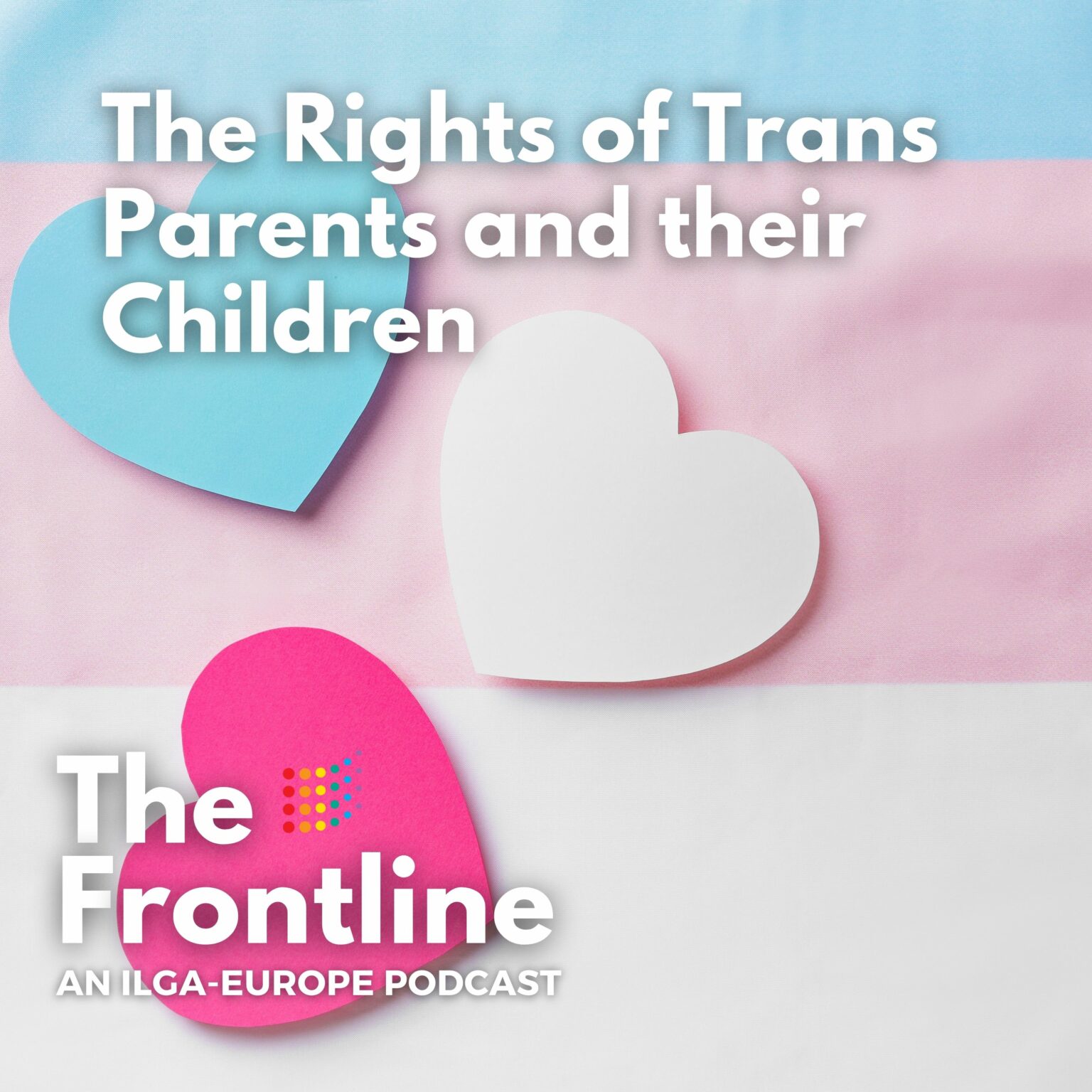
In March 2021, Transgender Europe (TGEU) published the report, “Stuck on the swing: experiences of trans parents with freedom of movement in the EU”, in which 18 trans parents from across Europe shared their stories and thoughts. The report found that trans parents and their families face serious barriers when it comes to moving safely and freely across the European Union.
In the fifth part of our mini-series on rainbow family rights, during which we we’re looking at the issues affecting LGBTI partners, parents and their children across Europe, we talk to Senior Policy Officer with TGEU, Richard Köhler, and Slovenian trans-activist, Lea Aymard, one of the parents featured in the report, about the current state of play and ways forward.
Hungarian Constitutional Court has annulled new rules prohibiting legal gender recognition
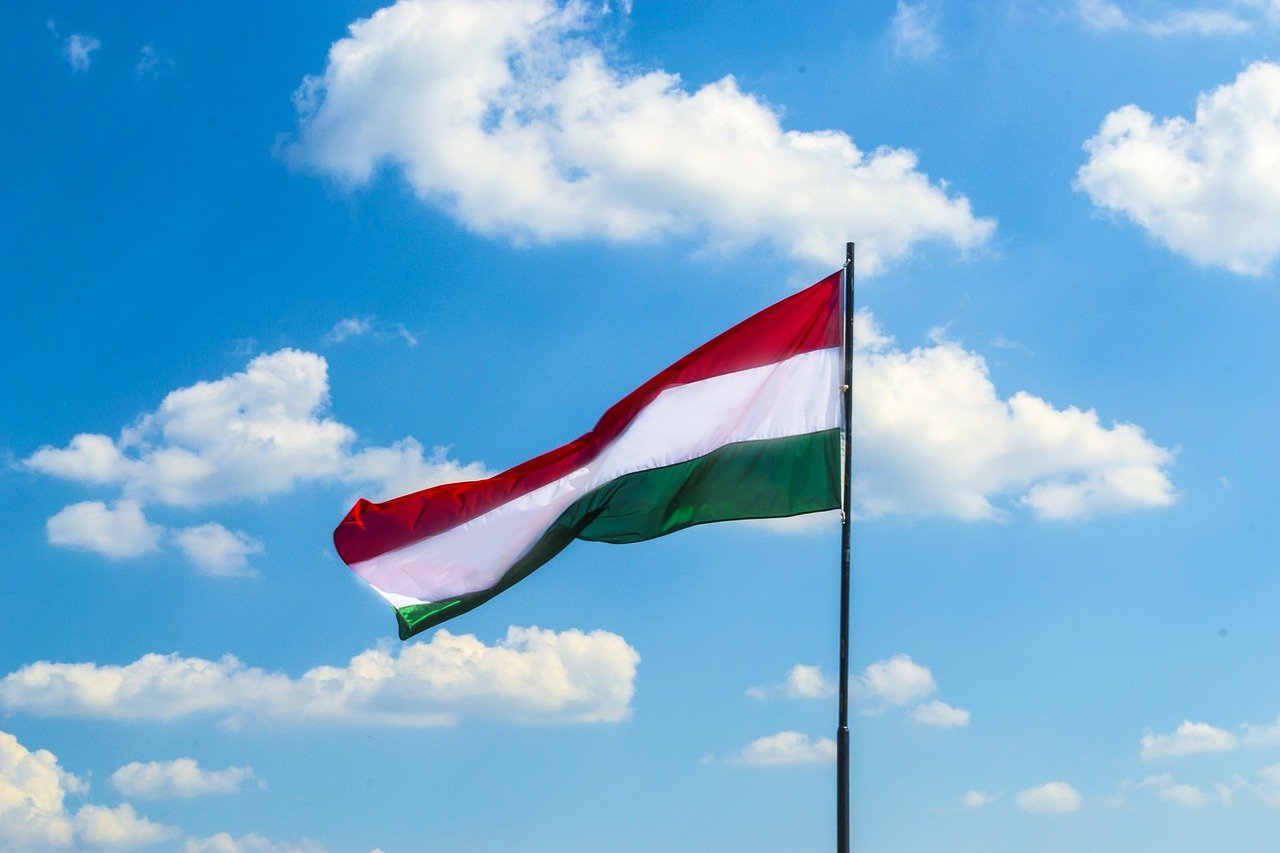
The Hungarian Constitutional Court has annulled the provision of the Registry Procedure Act introduced by Section 33, which contained that the new rules prohibiting legal gender recognition shall also be applied to ongoing proceedings.
Last March, at the height of the first wave of the coronavirus pandemic, a few days after the declaration of the state of emergency, Deputy Prime Minister Zsolt Semjén submitted an omnibus bill to Hungarian Parliament. Its Section 33 proposed the abolition of legal gender recognition in Hungary.
The law forces trans and intersex people to use documents that do not reflect their gender identity and / or appearance. In addition, Section 33 included a provision amending the Registry Procedure Act to apply the new rules to ongoing proceedings as well, which is particularly problematic in view of the fact that many trans people have been waiting for years to have their legal gender recognition requests processed.
Following the entry into force of Section 33, these previous requests were rejected by the authorities citing the new legislation. However, with the help of Háttér Society and the Hungarian Helsinki Committee, a number of trans people challenged the rejection decisions via judicial review. In December, the Miskolc Court of Appeal requested the Constitutional Court to declare the provision prescribing the application of the new law to ongoing proceedings unconstitutional.
In its decision published today, the Constitutional Court sided with the applicant and Miskolc Court of Appeal and annulled the relevant provision of Section 33. According to the Court, “within the scope of the state’s obligation to protect institutions, it may not create a procedural framework that restricts a right guaranteed in the Fundamental Law in an unconstitutional manner”.
The Court specifically highlighted its 2018 decision, which declared that having the possibility to change one’s gender and name is an unrestrictable fundamental right for transgender people.
With the decision of the Constitutional Court, the unconstitutional situation caused by Section 33 will not be completely eliminated. The decision of the Constitutional Court only applies to the ongoing proceedings, so whoever has not previously applied for legal gender recognition, still has no right to do so.
Háttér Society will pursue litigation in order for the Constitutional Court to declare the entire Section 33 unconstitutional.
LGBTI rights groups welcome judgement finding Romania in violation of the European Convention on Human Rights because of a lack of proper legal framework for legal gender recognition

Romania has been found to be in violation of the European Convention on Human Rights because its authorities present transgender people with an impossible dilemma.
LGBTI rights organisations, ILGA-Europe and Transgender Europe (TGEU) have welcomed today’s judgment in the cases of X and Y v Romania, the European Court of Human Rights (ECtHR) found a violation of Article 8 of the European Convention, in that Romania lacked a clear and foreseeable legal framework for the legal gender recognition. The Court’s judgment was informed by a third-party intervention submitted jointly by ILGA-Europe and TGEU.
The applicants in the case, Mr. X and Mr. Y, spent years in the national courts requesting the authorisation for gender reassignment from female to male and an administrative change of forename and personal digital identity code, and other necessary changes in the civil-status register indicating the applicant’s new forename and male gender. The relevant administrative corrections were refused on the grounds that persons making such requests had to provide proof that they had undergone gender reassignment surgery.
While Applicant X was able to obtain male forenames by deed poll in the UK in 2015, he continued suffering constant inconvenience owing to the mismatch between the female identifiers on the papers issued by the Romanian authorities and the male identifiers on the various documents he had obtained in the United Kingdom. While waiting for a decision from the European Court, Applicant Y felt compelled to undergo various surgeries in order to be able to make the necessary alterations to his civil-status records and have a new birth certificate issued.
The ECtHR observed that the lack of procedure and unreasonable requirements by the national courts had presented both applicants with an impossible dilemma: either they were forced to undergo the surgery, contrary to their right to respect for their physical integrity, or they had to forego recognition of their gender identity, which also came within the scope of respect for private life.
ECtHR finding
The Court found a violation of ECHR Article 8 in that Romania lacked a clear and foreseeable legal framework for legal gender recognition. The Court recalled recommendations by the Committee of Ministers and the Parliamentary Assembly of the Council of Europe, as well as the United Nations High Commissioner for Human Rights and the UN Independent Expert on SOGI calling on States to adopt procedures allowing persons to have their name and gender changed on official documents in a quick, transparent and accessible manner.
The Court also found that the State failed to provide fair balance between the general interest and the individual interests of the persons concerned.
Unfortunately, the Court did not address Article 14 claims on non-discrimination based on gender identity that affects the applicants, and thus did not clearly condemn any surgery requirements in legal gender recognition procedures as discriminatory.
Romania’s ACCEPT association estimates that around 120,000 transgender people live in the country, while less than 50 have managed to change their civil status documents in the last 20 years.
According Patrick Br?ila, co-president of ACCEPT: “Gender identity is an inner feeling and a deeply private one, which must be ascertained by the civil status authority on the basis of the trans person’s statement, without being required to provide medical evidence, the testimonies of others, or worse, to be forced to undergo surgery on the genitals that the person in question either does not want or that are impossible to have in our country, due to the absence of specialists in the field. These interventions cost over €50,000 in foreign countries. We therefore request the Government of Romania, which has the obligation to implement this decision, to develop in collaboration with the ACCEPT Association and the transgender community in Romania, a simplified administrative procedure that allows the modification of identity documents of trans persons, respecting their dignity and personal autonomy and their right to self-determination.”
Welcoming the judgement, Antonella Lerca, member of the TGEU Board said: “Transgender people in Romania are very excited about the news from the European Court of Human Rights. We have been waiting for a long time to hear this, particularly those at the margins. Trans sex workers, poor and homeless trans people, have been rejected by society and been trampled on by the State. We call upon the Romanian state to respect its obligations and immediately introduce a legal gender recognition procedure that is quick, transparent, and accessible and based on self-determination.”
Head of Litigation at ILGA-Europe, Arpi Avetisyan added: “We welcome this judgment as it reiterates the need for establishment of a clear legal framework for the legal gender recognition without any requirements violating the right to privacy and bodily integrity in Council of Europe Member States. Putting trans people in a dilemma of choosing between having their physical integrity respected or having their gender identity recognised is unacceptable. The Court took note of declining number of Member States requiring gender reassignment surgery as a prerequisite for legal gender recognition. It is time that countries across Europe set in place legal gender recognition procedures in line with international human rights standards.”
Further information:
- Find out more about the judgement.
- Find here our intervention.
- Find out more about ILGA-Europe’s strategic litigation work.
- Find out more about Romania in our Rainbow Map
For media requests, please contact Ana Muñoz: ana@ilga-europe.org,
A.H. and Others v Germany
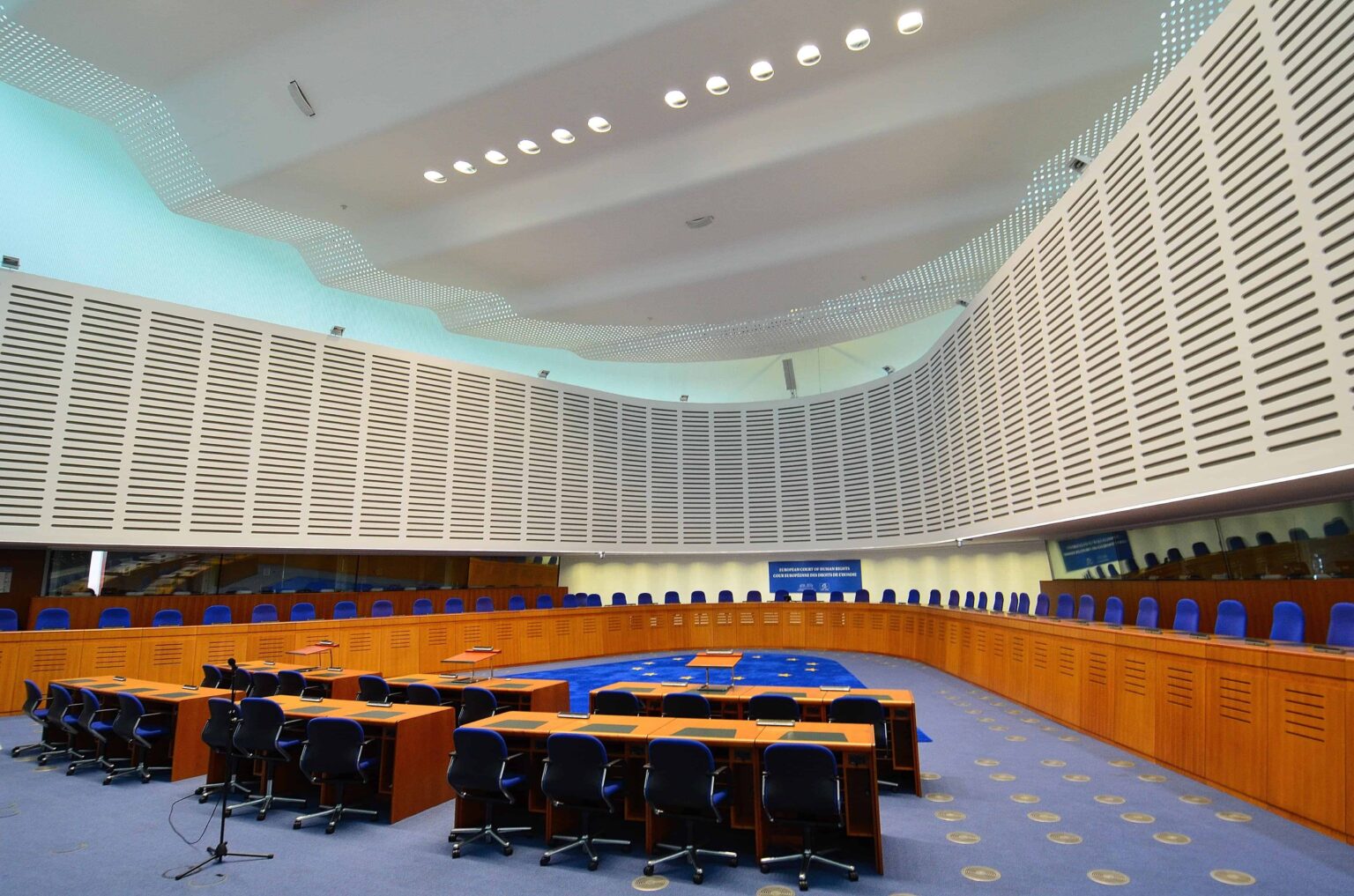
Recognition of trans parenthood.
Submitted jointly by ILGA-Europe, TGEU, and Bundesverband Trans*.
Find here the communicated case.
The Court made its decision on 4 April 2023, which found that it is within the State’s discretion to list a trans parent on their child’s birth certificate using a “deadname” and sex assigned at birth.
Joint statement calling on the Parliament of Kazakhstan to protect trans people’s rights to health and legal gender recognition
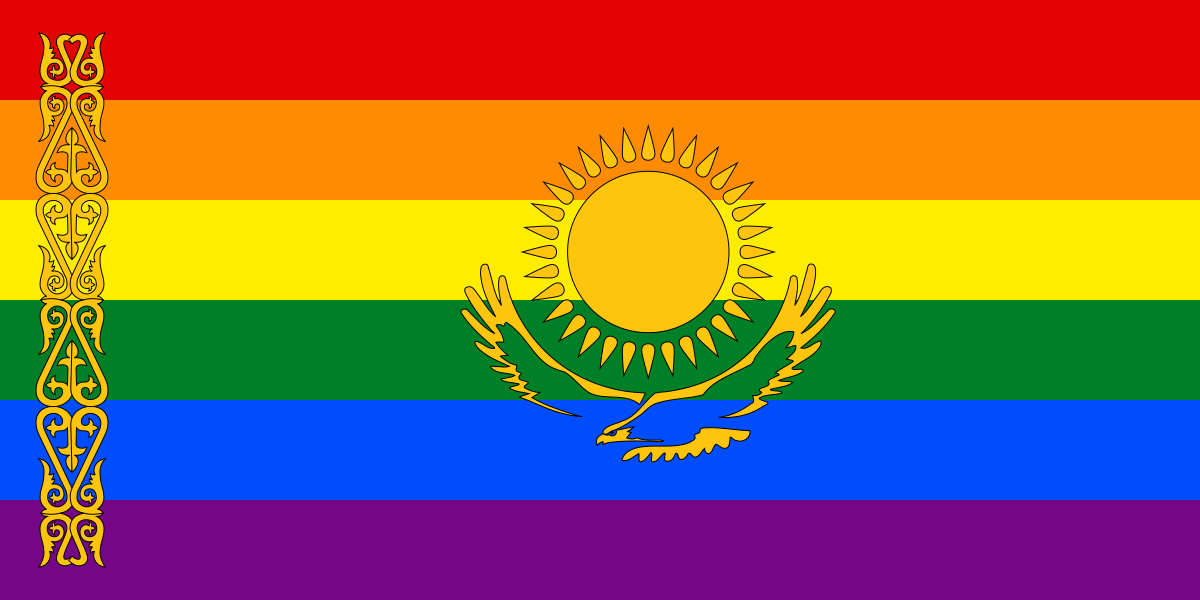
TGEU, ILGA-Europe, and IGLYO, the three largest networks of LGBTI and trans organisations working in Europe and Central Asia, are calling on the Parliament of Kazakhstan to remove the age limit from their proposed amendment No. 539 to the draft “Code on the health of the people and the healthcare system”.
The proposed amendment will make it impossible for trans people between the ages of 18 and 21 and trans people with “behavioural disorders” of all ages to exercise their right to legal gender recognition and other fundamental human rights set out in international human rights treaties ratified by Kazakhstan.
Member of Majilis, the Parliament of Kazakhstan, Zauresh Amanzholova proposed the Amendment No. 539 to Article 156 “Change of sex” in the draft “Code on the health of the people and the healthcare system.” The proposed amendment will increase the existing age limit from 18 to 21. This amendment is against the main principle of equal protection of the law and equality before the law guaranteed by Article 14 of the Constitution of Kazakhstan. The proposed change leads to the discrimination of the group of Kazakhstani citizens based on their identity as it singles out trans people in recognition of their legal age by the state. In addition, the amendment was introduced by the Majilis after the second Parliamentary hearing, leaving no opportunity for public consultation of interested parties as guaranteed by the laws “On public services” and “On access to information”.
We regret that civil society and expert organisations have not been involved in this process so far.
Amendment No. 539 will also limit trans young people’s access to trans-specific healthcare. This amendment goes against the right to health protection recognised by Article 18 of the Constitution of Kazakhstan. The real-life impact of not being able to socially and/or medically transition is enormous. Denying access to medical care to trans people between 18 and 21 is overt discrimination on the grounds of gender identity, as well as on the basis of age. In addition, it goes against the right to the enjoyment of the highest attainable standard of physical and mental health, and the principle of non-discrimination, as envisaged in the WHO Constitution and the Universal Declaration of Human Rights. The trans community must be legally protected against the existing discrimination, and not further marginalised by the authorities.
We condemn this action by the Parliament of Kazakhstan and call for a revision of Article 156 that considers civil society and expert organisation’s views!
Following the requests of the local trans community, we call upon the Parliament of Kazakhstan to:
- Withdraw age restriction and “behavioural disorder” restriction;
- Revise the terms used in the draft Code such as the “sex change” and “persons with sexual identity disorder and replace them with “gender-affirming care” and “persons with gender incongruence” respectively, in line with ICD-11, Kazakhstani legislation, and international standards;
- Increase support to the trans community with legal protections in terms of healthcare and legal gender recognition without discrimination.
TGEU, ILGA-Europe, and IGLYO call on the Parliament of Kazakhstan to review Article 156 as soon as possible. Further, we call on international human rights actors to raise awareness of this issue and support the human rights of trans people in Kazakhstan.
Response to Hungarian Prime Minister Viktor Orbán regarding to Article 33 of the proposed Omnibus Bill, 2020

In response to Hungarian Prime Minister Viktor Orbán letter dated 5 May 2020, regarding to Article 33 of the proposed Omnibus Bill, 2020.
Dear Prime Minister Orbán,
Dear Deputy Secretary Schaller-Baross,
We write today to respond to your letter, dated 5 May 2020, to our organisations, of The European Region of the International Lesbian, Gay, Bisexual, Transgender and Intersex Association (ILGA-Europe), Organization Intersex International Europe (OII Europe), the regional umbrella organisation for intersex-led organisations in Europe, with members in more than 20 countries, and Transgender Europe (TGEU), in regards to Article 33 of the proposed omnibus bill of 2020, regarding reformulating the national registry to change the mutable category of “sex” to an immutable category of “sex at birth”.
As previously noted, we, along with our members in Hungary, strongly oppose the proposed amendment to the national registry, such that it will effectively make legal gender recognition for trans and intersex people impossible in Hungary, which contravenes EU and international human rights law and violates the well-established right to private and family life for trans and intersex Hungarians. Our previous letter, dated 24 April 2020, outlined the broad consensus among international human rights actors to this end.
We write today to address specific issues raised in your reply letter which are cause for concern. Firstly, we wish to address your reference to “a long-standing uncertainty in the interpretation of the law”. There is a clear understanding in European and international human rights law contexts that the mutable personal characteristic of “sex” is one that, so long as it is publicly recorded by States, should be possible to change to protect the human rights of trans and intersex people to private and family life, to health, to found a family and marry, and to recognition before the law.1 2 3 4 Legal gender recognition, the process by which one changes one’s sex marker in legal documents to reflect one’s gender identity, is clearly established in long-standing jurisprudence from the European Court of Human Rights,5 particularly when it comes to the fundamental right protected under Articles 8 and 12 of the European Convention of Human Rights.6 Replacing a mutable identity marker with an immutable one does not clarify an uncertainty in jurisprudence, but rather acts in direct contradiction of the Court to make legal gender recognition impossible, avoiding the State responsibility to protect and promote fundamental rights, in fact directly violating those fundamental rights. With this Article, Hungary will make protection of the fundamental human rights of its trans and intersex citizens impossible in practice and in law. Curtailment of fundamental rights cannot be the best available solution for addressing a legal “uncertainty”.
Additionally, in your reply letter, you assert that Article 33 of the omnibus bill in no way prevents individuals from “living according to his or her own identity and self-determination”. Unfortunately, this assertion is false. As is well-documented,7 8 access to legal gender recognition for trans and intersex people is intertwined with the protection of many of their human rights. Because the civil register is directly connected to all available identity documents in Hungary, this change not only fixes the sex marker in the registry, but in all other subordinate documents. This means in practice that trans and intersex people will be forced to live with documents that do not align with their gender identity and expression throughout their lifetimes, exposing them to increased discrimination, stigma, harassment, and violence, as well as to disparities in access to the rights to health, housing, education, employment, and to access goods and services without discrimination, as enshrined in the values of the European Union and the Council of Europe.
As ILGA-Europe, OII Europe and TGEU, we reaffirm our call on the Hungarian government to heed your responsibilities under the international human rights law framework, to engage in good faith reforms designed to protect the human rights of all Hungarian citizens including trans and intersex people, and thus to amend the omnibus bill to remove Article 33 prior to a vote in the full Parliament.
Kind regards,
Katrin Hugendubel
Advocacy Director, ILGA-Europe
1. e.g. Recommendation CM/Rec(2010)5 of the Committee of Ministers to member states on measures to combat discrimination on grounds of sexual orientation or gender identity, available from: https://search.coe.int/cm/Pages/result_details.aspx?ObjectID= 09000016805cf40a.
2. Parliamentary Assembly of the Council of Europe Resolution 2048 (2015), ‘Discrimination against trans people in Europe’.
3. Commissioner for Human Rights of the Council of Europe, Human Rights and Gender Identity (29 July 2009) CommDH/ IssuePaper(2009), available from: https://rm.coe.int/16806da753.
4. G v Australia, Communication No. 2172/2012 (CCPR/C/119/D/2172/2012) (UN HRC, 15 June 2017).
5. B v France [1993] 16 EHRR 1.
6. Goodwin v United Kingdom [2002] 35 EHRR 18.
7. Grant v United Kingdom [2006] ECHR 548.
8. Report of the Independent Expert on protection against violence and discrimination based on sexual orientation and gender identity (11 May 2018) UN Doc No. A/HRC/38/43.
What have happened?
– On 31 March, Trans Day of Visibility, the Hungarian government released a large bill consisting of many legislative proposals – one of these, Article 33, would make legal gender recognition impossible, massively curtailing the rights of trans and intersex citizens of Hungary.
– On 6 April, ILGA-Europe and TGEU released a statement calling on the Hungarian Parliament and the Parliament to drop Article 33 of a legislative omnibus bill.
– On 27 April, ILGA-Europe, OII-Europe, and TGEU sent a joint letter to Hungarian Prime Minister Viktor Orbán.- On 15 May, ILGA-Europe, OII-Europe, and TGEU sent a joint response to Hungarian Prime Minister Viktor Orbán’s letter.
– On 2 April, 22 Hungarian human rights and LGBT NGOs released a statement.
– On 2 April, the Council of Europe’s Commissioner for Human Rights shared a statement.
– On 14 April, the UN Independent Expert on protection against violence and discrimination based on sexual orientation and gender identity; the Special Rapporteur on the right of everyone to the enjoyment of the highest attainable standard of physical and mental health; the Special Rapporteur on the right to privacy and the Special Rapporteur on violence against women, its causes and consequences sent a letter to Hungarian government.
– On 20 April, the European Professional Association for Transgender Health (EPATH) and European Society for Sexual Medicine (ESSM), released a statement.
– On 15 April, 63 Members of the European Parliament sent a letter to Hungarian government.
– On 17 April, the Hungarian Psychological Association released a statement.
– On 17 April, the European Parliament passed a resolution.
– On 17 April, the UN High Commissioner on Human Rights referred explicitly to the bill as bad practice.- Transvanilla Association and All Out has collected over 24,000 signatures for a petition against the Article 33.
– You can SUPPORT the #Drop 33 campaign on Twitter, Instagram, or TikTok.- A vote in Parliament is expected on 19 May.
Letter to Hungarian Prime Minister Viktor Orbán: in regards to Article 33 of the proposed Omnibus Bill, 2020
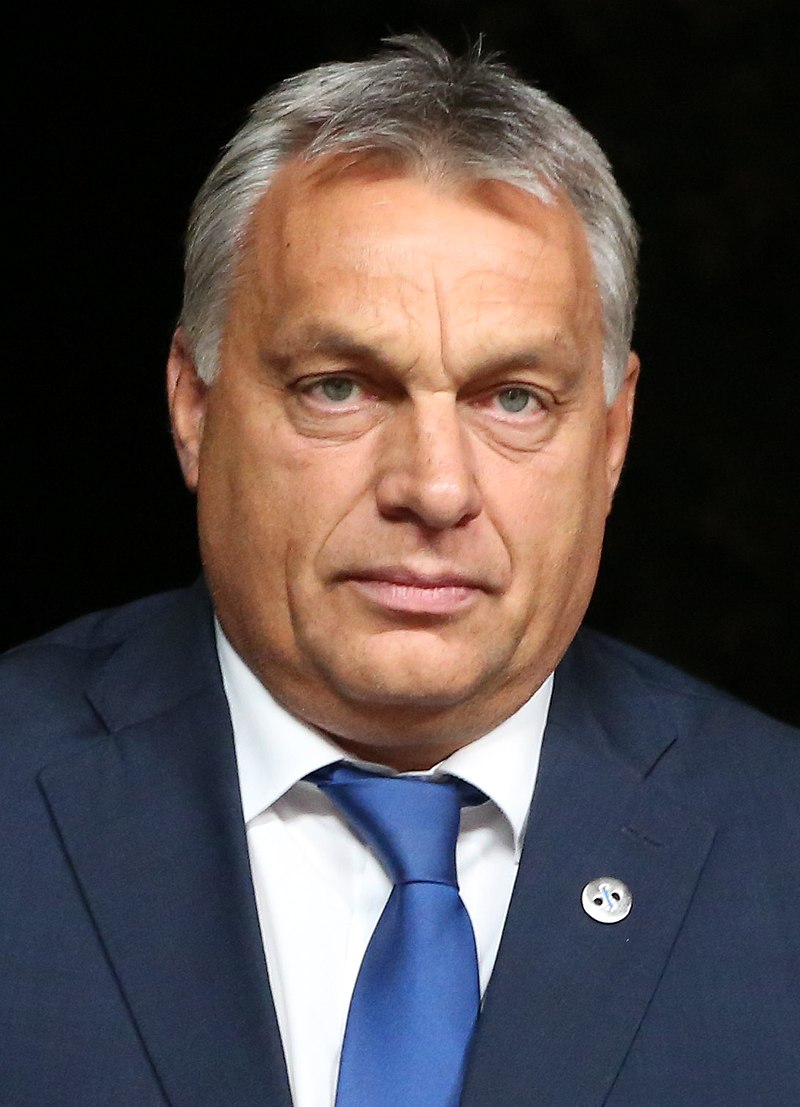
In our continued call for the Hungarian government to stop the attack on legal gender recognition, we have sent a joint letter with OII-Europe and TGEU. In the letter, we list the international calls to #Drop33 of a legislative omnibus bill–which would deny access to legal gender recognition in the country–including from the COE Commissioner for Human Rights and an admonition from the UN High Commissioner for Human Rights.
Dear Prime Minister Orbán,
This letter, on behalf of The European Region of the International Lesbian, Gay, Bisexual, Transgender and Intersex Association (ILGA-Europe), a regional non-governmental organisation focused on the rights of LGBTI people with over 600 members in 54 countries in Europe and Central Asia, Organization Intersex International Europe (OII Europe), the regional umbrella organisation for intersex-led organisations in Europe, with members in more than 20 countries, and Transgender Europe (TGEU), a member-based oragnisation for the trans community in Europe and Central Asia with 140 member organisations in 44 countries, brings to your attention the response to Article 33 of the proposed omnibus bill of 2020, regarding reformulating the national registry to change the mutable category of “sex” to an immutable category of “sex at birth”.
We, along with our members in Hungary, strongly opposed the proposed amendment to the national registry, such that it will effectively make legal gender recognition for trans and intersex people impossible in Hungary, which contravenes EU and international human rights law and violates the well-established right to private and family life for trans and intersex Hungarians.
We write to bring to your attention the clear and strong call of many international human rights organs and actors in opposition to this measure. You will note that there have been objections published by:
- 22 Hungarian human rights and LGBT NGOs,
- the Hungarian Psychological Association,
- the Council of Europe’s Commissioner for Human Rights,
- 63 Members of the European Parliament,
- the European Parliament as a whole,
- the UN Independent Expert on protection against violence and discrimination based on sexual orientation and gender identity; the Special Rapporteur on the right of everyone to the enjoyment of the highest attainable standard of physical and mental health; the Special Rapporteur on the right to privacy and the Special Rapporteur on violence against women, its causes and consequences,
- the European Professional Association for Transgender Health (EPATH) and European Society for Sexual Medicine (ESSM), and
- the UN High Commissioner on Human Rights, which refers explicitly to the bill as bad practice. Additionally, a petition against the Article has collected over 22,000 signatures as of the writing of this letter.
As ILGA-Europe, OII Europe and TGEU, we call on you to heed your responsibilities under the international human rights law framework, and to amend the omnibus bill to remove Article 33 prior to a vote in the full Parliament.
Kind regards,
Katrin Hugendubel
Advocacy Director, ILGA-Europe
What have happened?
– On 31 March, Trans Day of Visibility, the Hungarian government released a large bill consisting of many legislative proposals – one of these, Article 33, would make legal gender recognition impossible, massively curtailing the rights of trans and intersex citizens of Hungary.
– On 6 April, ILGA-Europe and TGEU released a statement calling on the Hungarian Parliament and the Parliament to drop Article 33 of a legislative omnibus bill.
– On 27 April, ILGA-Europe, OII-Europe, and TGEU sent a joint letter to Hungarian Prime Minister Viktor Orbán.- On 15 May, ILGA-Europe, OII-Europe, and TGEU sent a joint response to Hungarian Prime Minister Viktor Orbán’s letter.
– On 2 April, 22 Hungarian human rights and LGBT NGOs released a statement.
– On 2 April, the Council of Europe’s Commissioner for Human Rights shared a statement.
– On 14 April, the UN Independent Expert on protection against violence and discrimination based on sexual orientation and gender identity; the Special Rapporteur on the right of everyone to the enjoyment of the highest attainable standard of physical and mental health; the Special Rapporteur on the right to privacy and the Special Rapporteur on violence against women, its causes and consequences sent a letter to Hungarian government.
– On 20 April, the European Professional Association for Transgender Health (EPATH) and European Society for Sexual Medicine (ESSM), released a statement.
– On 15 April, 63 Members of the European Parliament sent a letter to Hungarian government.
– On 17 April, the Hungarian Psychological Association released a statement.
– On 17 April, the European Parliament passed a resolution.
– On 17 April, the UN High Commissioner on Human Rights referred explicitly to the bill as bad practice.- Transvanilla Association and All Out has collected over 24,000 signatures for a petition against the Article 33.
– You can SUPPORT the #Drop 33 campaign on Twitter, Instagram, or TikTok.- A vote in Parliament is expected on 19 May.
#Drop33: Europe’s Two Largest Networks of LGBTI and Transgender Organisations call on Hungarian Parliament to Reject Attempts to Ban Legal Gender Recognition

ILGA-Europe and Transgender Europe, the two largest networks of LGBTI and trans organisations in Europe and Central Asia, representing over 800 organisations and groups across the region collectively, are calling on the Hungarian Parliament and the Justice Committee of the Parliament to drop Article 33 of a legislative omnibus bill, which would deny access to legal gender recognition in the country.
The Hungarian government Tuesday, 31 March, released a draft omnibus bill simultaneously amending many laws and provisions. One of the laws proposed for amendment relates to legal gender recognition for trans people – proposing to replace “sex” with “sex assigned at birth” in the national registry and on identity documents, as cited in Article 33 of the omnibus bill.
The cited reasoning for this amendment is:
“The sex entered into the civil registry is based on facts determined by doctors, declared by the registry. The registry certifies the facts and rights it includes until proven otherwise, therefore it does not create rights. However, the sex declared by the registry could create rights or obligations, and therefore it is necessary to define the term of birth sex. Given that completely changing one’s biological sex is impossible, it is necessary to lay it down in law that it cannot be changed in the civil registry either.”
Functionally, this amendment would mean that legal gender recognition would become impossible under any circumstances in Hungary, because all current mentions of “sex” in identity documents would be changed to the immutable characteristic of “sex assigned at birth”. Currently identity documents can be changed in Hungary by law, although processes have been suspended for nearly two years.
The amendment comes at a time when the Hungarian Parliament has given Prime Minister Viktor Orbán power to rule by decree indefinitely because of the COVID-19 crisis, which means he no longer needs to consult other lawmakers before making policy decisions. Orbán’s attacks against the LGBTI community go back to 2015, when he blocked a draft agreement at the Council of the European Union which called on the European Commission to tackle homophobic and transphobic discrimination. He has also refused to ratify the Istanbul Convention because of its definition of gender as a social construct, and in 2017 he hosted the International Organisation of the Family (IOF), a US group which campaigns against same-sex marriage.
The Hungarian people overwhelmingly support access to legal gender recognition for trans people. According to a Median representative survey in September 2019, 70% of respondents believe that trans people should have access to legal gender recognition and only 17% believed that trans people should under no circumstances change their gender or name in their papers.
According to Advocacy Director of ILGA-Europe, Katrin Hugendubel: “Case law from the European Court of human rights clearly establishes the right to legal gender recognition for transgender people. International human rights actors must act firmly and swiftly to stop this extreme rollback in a settled area of human rights law.”
Trans-led Hungarian civil society organisation Transvanilla Transgender Association President Barnabás Hidasi affirms that “legal gender recognition ensures a person’s right to self-determination, and that procedures must be existent, quick, transparent, and accessible”.
“Hungary’s proposed Article 33 runs counter to well-established international human rights standards, including the Council of Europe’s recommendations to member states,” said Masen Davis, Interim Executive Director at Transgender Europe (TGEU). “This dangerous bill would subject trans people in Hungary to increased scrutiny, discrimination, and violence. The Parliament should be focusing on what the people of Hungary to survive the COVID-19 pandemic, not using this crisis as cover to roll back the rights of an already-marginalised group.”
ILGA-Europe and Transgender Europe call on the Hungarian Parliament and the Justice Committee of the Parliament to #Drop33, amending the omnibus bill to protect the fundamental rights of all Hungarians. Further, we call on international human rights actors to raise awareness of this issue, and call on the Hungarian government to mobilise to protect trans people in Hungary and everywhere from derogations of their rights.
For further comment, contact Ana Muñoz Padrós, Communication and Media Officer, ILGA-Europe at ana@ilga-europe.org or +32 2 609 56 59.